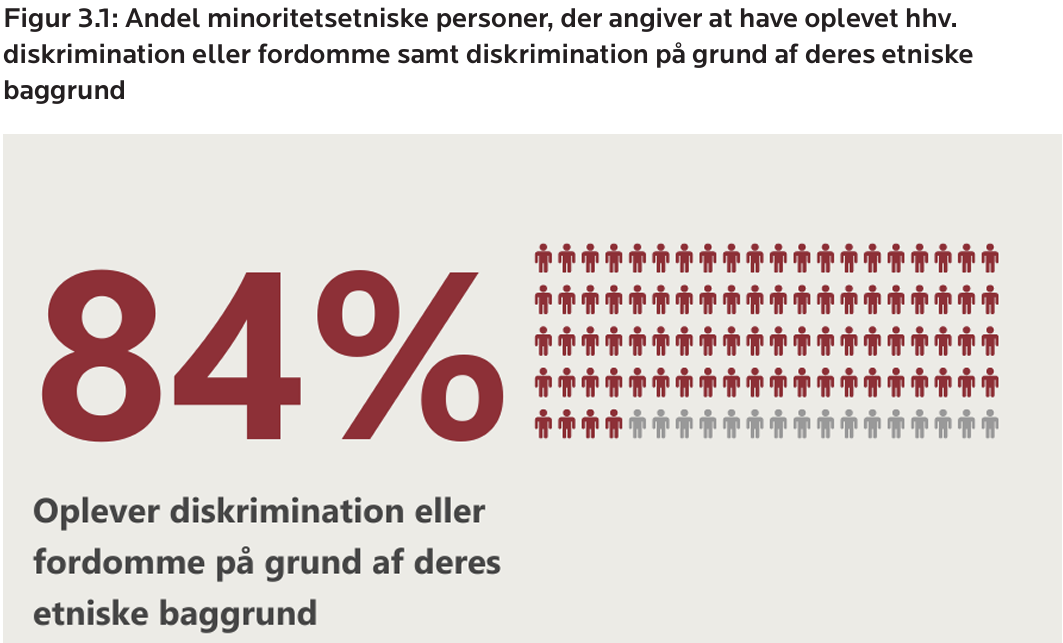Misperceived Discrimination
Merlin Schaeffer
2024-06-04
Perceived Prevalence How prevalent is discrimination (mis-)perceived to be?
 Source: ChatGPT 4
Source: ChatGPT 4

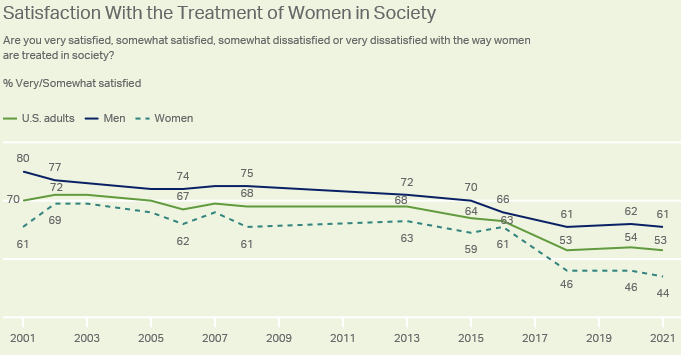 Source: Gallup
Source: Gallup
- Second dimension of Contested Discrimination: Competing views rightarrow competing perceived prevalences.
- Two examples that are not directly related but represent my curiosity on the topic:
- According to both black/women and men/white people, relations have considerably deteriorated in the US.
- Note that Male/white perspective is ambiguous.
- Still, the question is: Have things really been better in 2001?
- A divergence of perceptions is more obvious when it comes to the topic of my work.
- ChatGPT graphic:
- How come that the same reality may be perceived so differently?
- Is there also a trend over time?
- How do these perceptions deviate from "reality"?
Perceived Prevalence How prevalent is discrimination (mis-)perceived to be?
 Source: ChatGPT 4
Source: ChatGPT 4
 Source: TV2
Source: TV2
- Second dimension of Contested Discrimination: Competing views rightarrow competing perceived prevalences.
- Two examples that are not directly related but represent my curiosity on the topic:
- According to both black/women and men/white people, relations have considerably deteriorated in the US.
- Note that Male/white perspective is ambiguous.
- Still, the question is: Have things really been better in 2001?
Perceived Prevalence How prevalent is discrimination (mis-)perceived to be?
 Source: ChatGPT 4
Source: ChatGPT 4
| Social Mechanism | Minority | Majority |
|---|---|---|
| Divergent Awareness | Integration → awareness of group's enduring marginalized status. | Minority integration → impression of successful diversification of society. |
| Divergent Definition | Claim to equality → increased sensitivity & confidence to interpret subtle events as discrimination. | Maintain way of life and privileges → set high standards for what constitutes discrimination and be accused of it. |
| Divergent Opportunity Structure | ... there are 937=13.3 in which a minority experiences it. | For every interaction in which a majority member engages in or witnesses discrimination, ... ← |
- Second dimension of Contested Discrimination: Competing views rightarrow competing perceived prevalences.
- Two examples that are not directly related but represent my curiosity on the topic:
- According to both black/women and men/white people, relations have considerably deteriorated in the US.
- Note that Male/white perspective is ambiguous.
- Still, the question is: Have things really been better in 2001?
Three social mechanisms could explain a trend of divergence.
Do the 3 mechanisms drive perceptions away from "reality"?
The field lacks a methodology to measure misperceptions of discrimination – a crucial barrier.
- Remainder of talk: My experimentation with various methods to measure misperceptions of discrimination.
- But no answer yet, whether these three social mechanisms drive them!
How accurate do majority and minority citizens
perceive ethno-racial discrimination?
We cannot observe
hidden intentions.
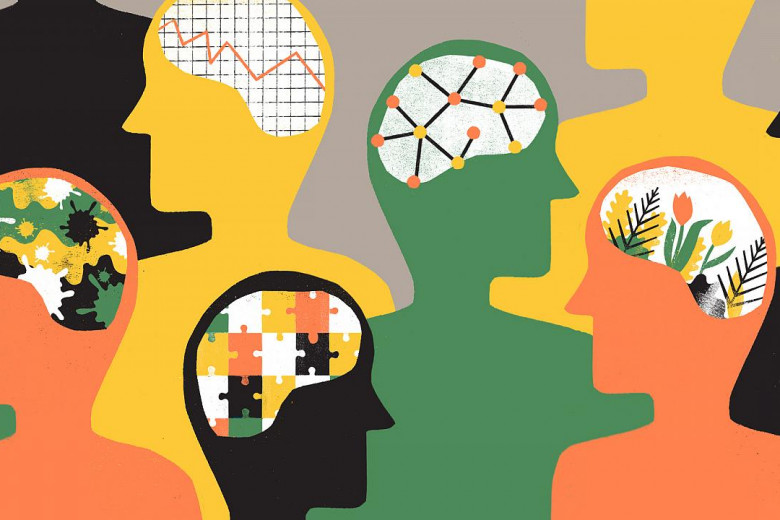


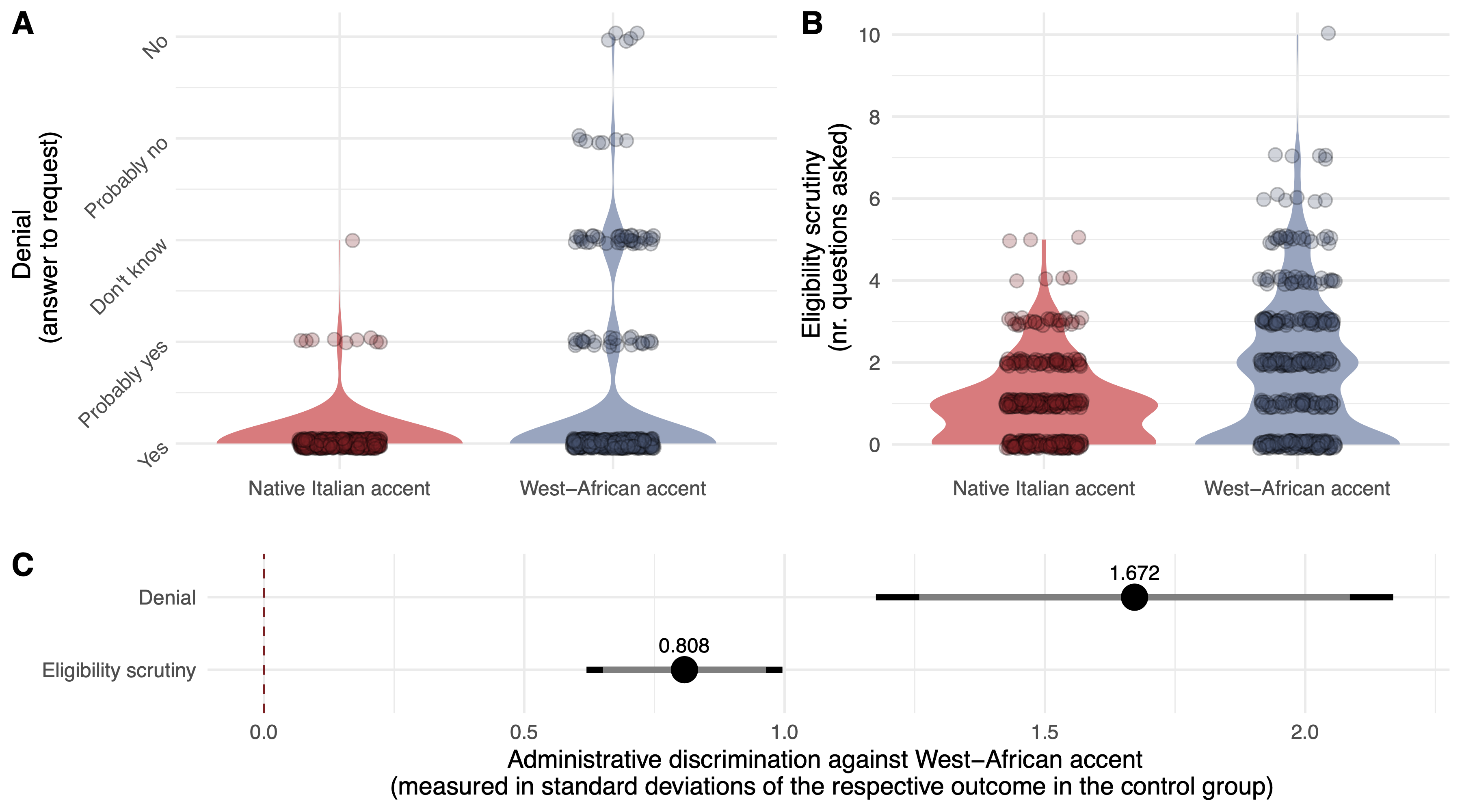 Source: Schaeffer, Krakowski, Romarri, and Rosenberg (2024)
Source: Schaeffer, Krakowski, Romarri, and Rosenberg (2024)
→ Price: Fictitious cases identify discrimination in the aggregate!
Misperceived Prevalence of Discrimination
Claim 1: Majority citizens tend to overperceive prevalence of minority discrimination.
Claim 2: Lack of awareness does not explain low support for anti-discrimination legislation.
- First method: Misperceived prevalence.
- Focus on majority members: Native-born Danes with native-born parents.
Misperceived Prevalence
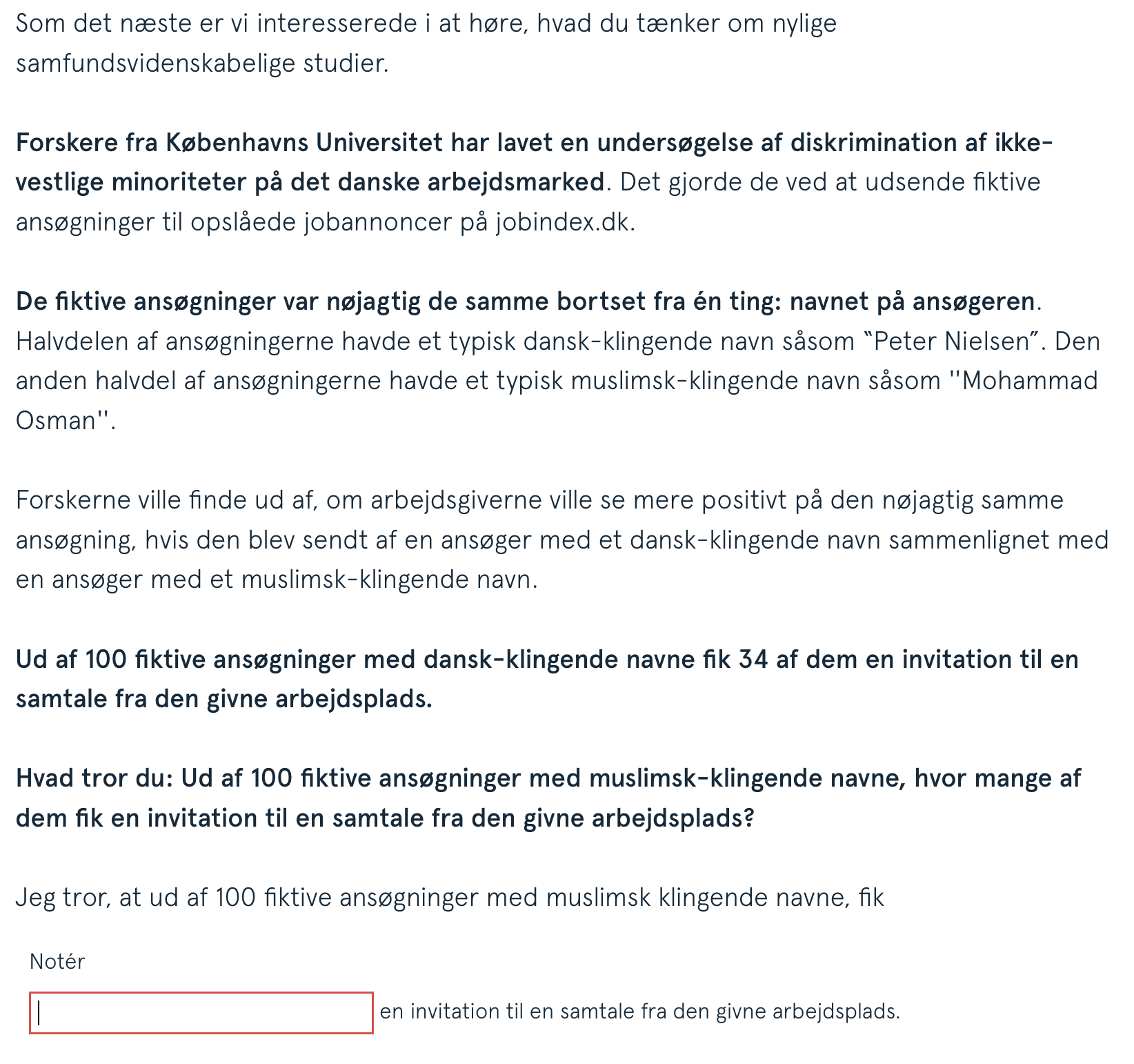 Source: Schaeffer, Krakowski, and Olsen (2023)
Source: Schaeffer, Krakowski, and Olsen (2023)
- Inspired by two economists: We explain field experiment and ask people what outcome they suspect.
Misperceived Prevalence
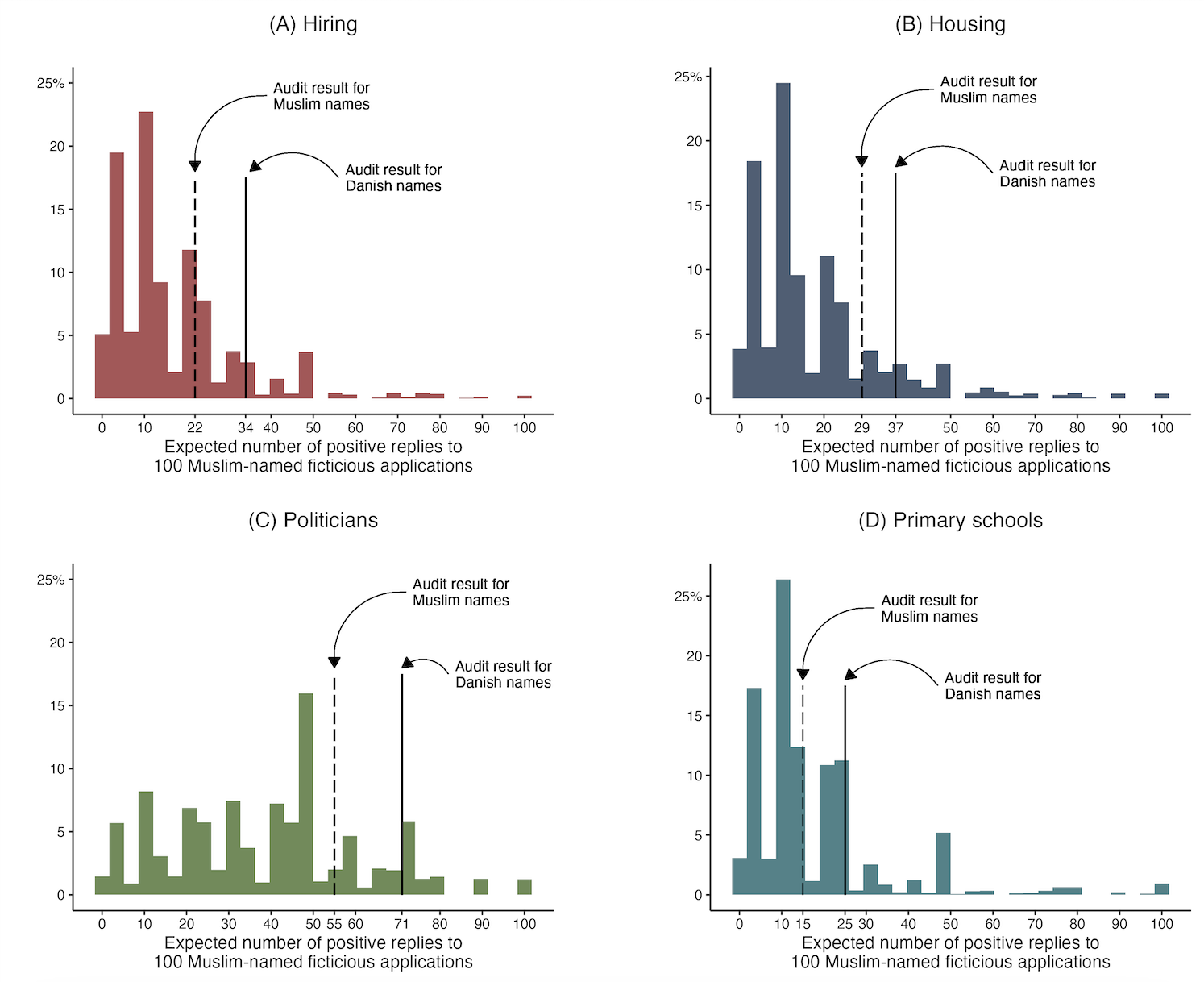
Source: Schaeffer, Krakowski, and Olsen (2023). Post-stratification weighted results. nHiring=1,045, nHousing=1,041, nPolitics=1,043, and nSchools=1,041 mainstream-majority Danes.
- We did this with all filed experiments conducted in DK so far: Peter, Asmus, etc.
- Let me help you interpret this.
Misperceived Prevalence

Source: Schaeffer, Krakowski, and Olsen (2023). Post-stratification weighted results. nHiring=1,045, nHousing=1,041, nPolitics=1,043, and nSchools=1,041 mainstream-majority Danes.
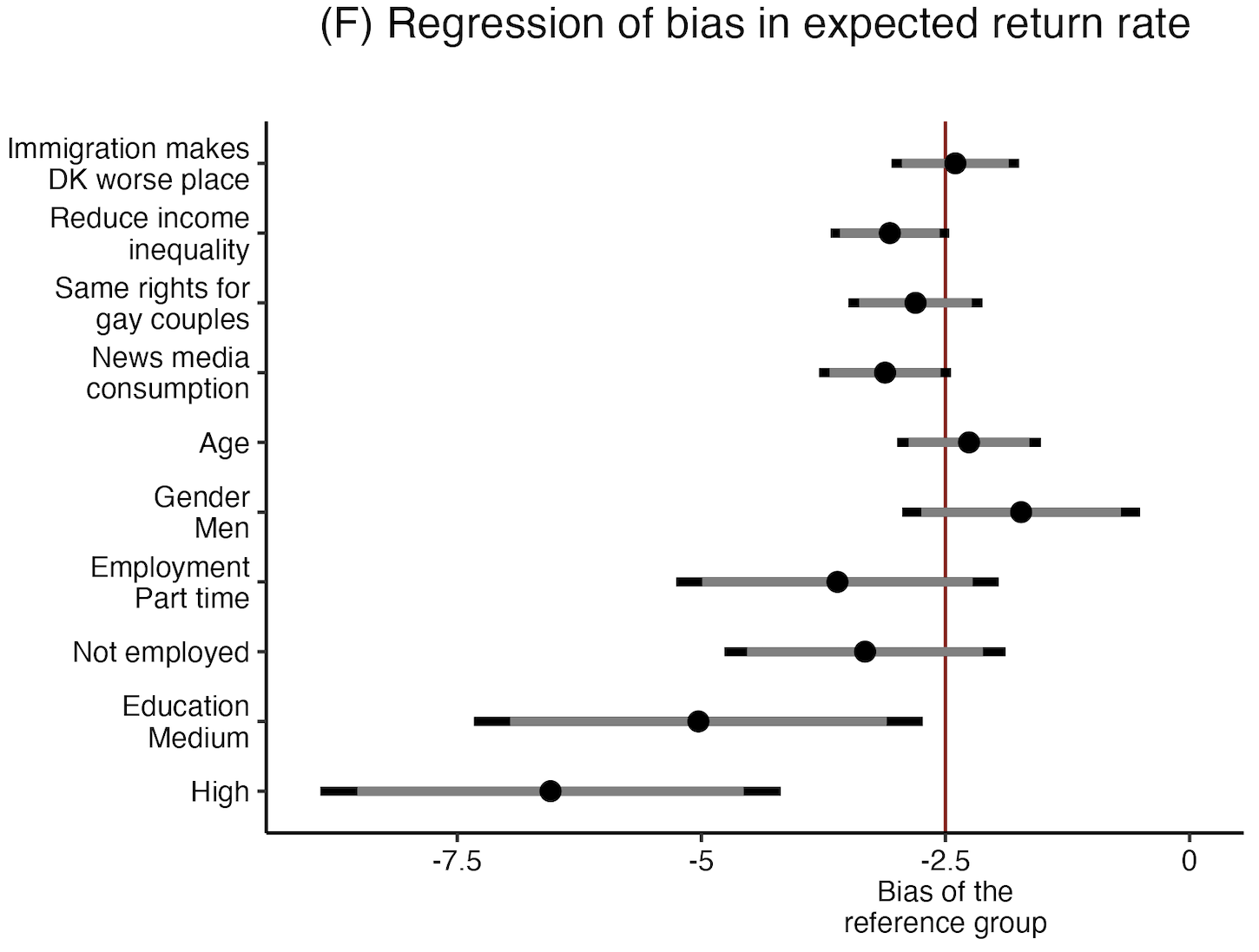
- We did this with all filed experiments conducted in DK so far: Peter, Asmus, etc.
- Let me help you interpret this.
- In contrast to 3 mechanisms: No evidence of vested interest in perceiving little discrimination.
- Even among those who are against immigration!
- Only education: We academics are more off!
Misperceived Prevalence
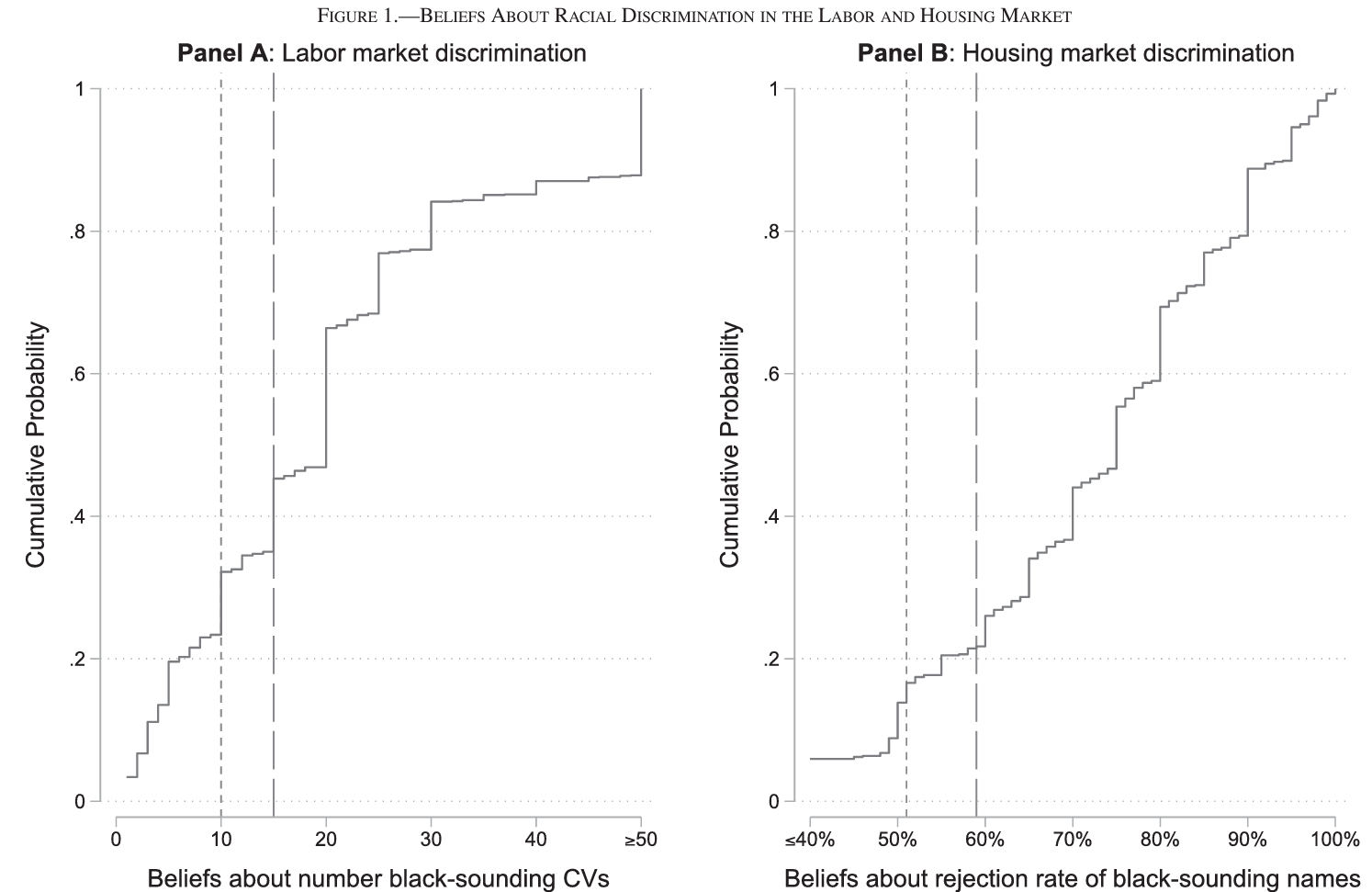 Source: Haaland and Roth (2023)
Source: Haaland and Roth (2023)
- Same in the US for discrimination against Black people.
Misperceived Prevalence
 Source: Haaland and Roth (2023)
Source: Haaland and Roth (2023)
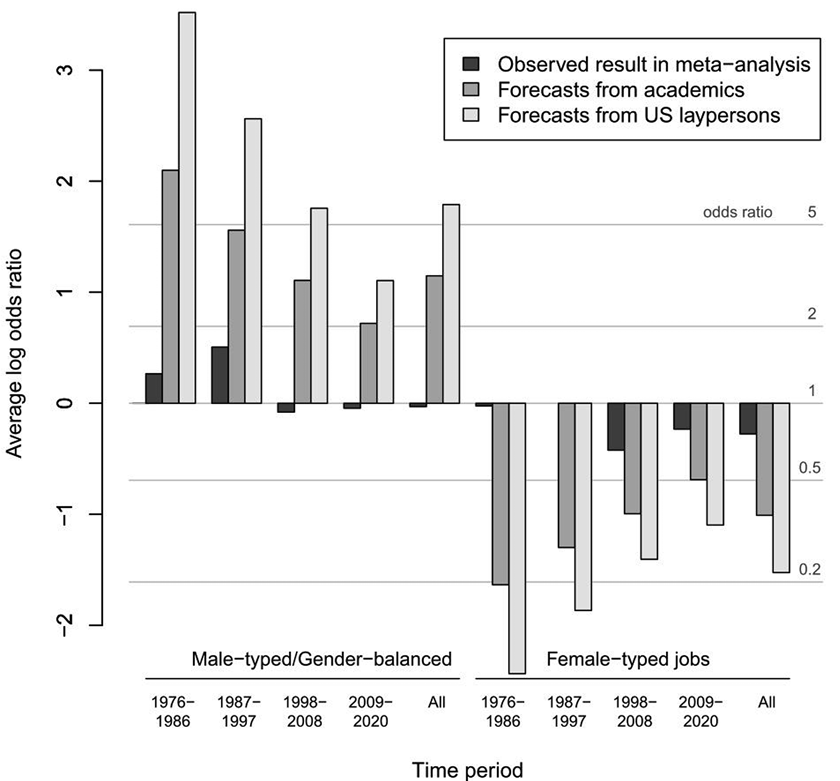
Source: Schaerer, du Plessis, Nguyen, van Aert, Tiokhin, Lakens, Giulia Clemente, Pfeiffer, Dreber, Johannesson, Clark, and Luis Uhlmann (2023)
- Same in the US for discrimination against Black people.
- Same for how prevalent we believe gender discrimination to be.
Factural Correction
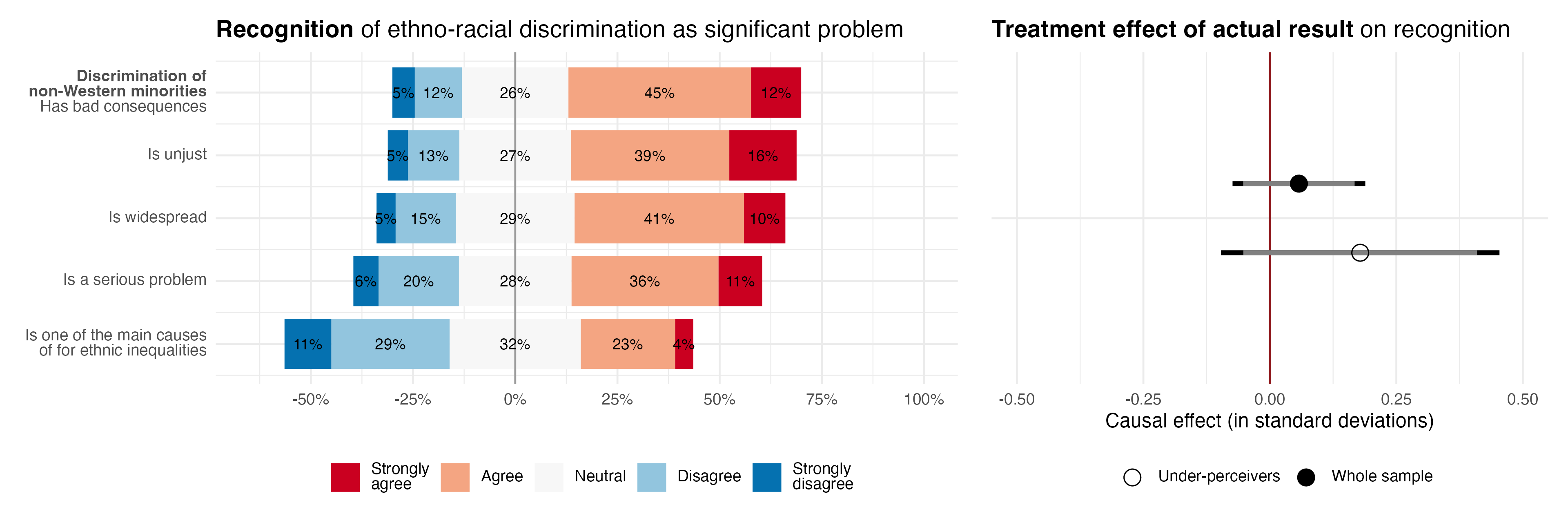
Source: Schaeffer, Krakowski, and Olsen (2023); Post-stratification weighted results. n = 769.
- Unsurprisingly, informing people about the actual result, does not change their recognition of the problem.
- Not even among those who underestimated the extent of discrimination.
Divergent Definition?
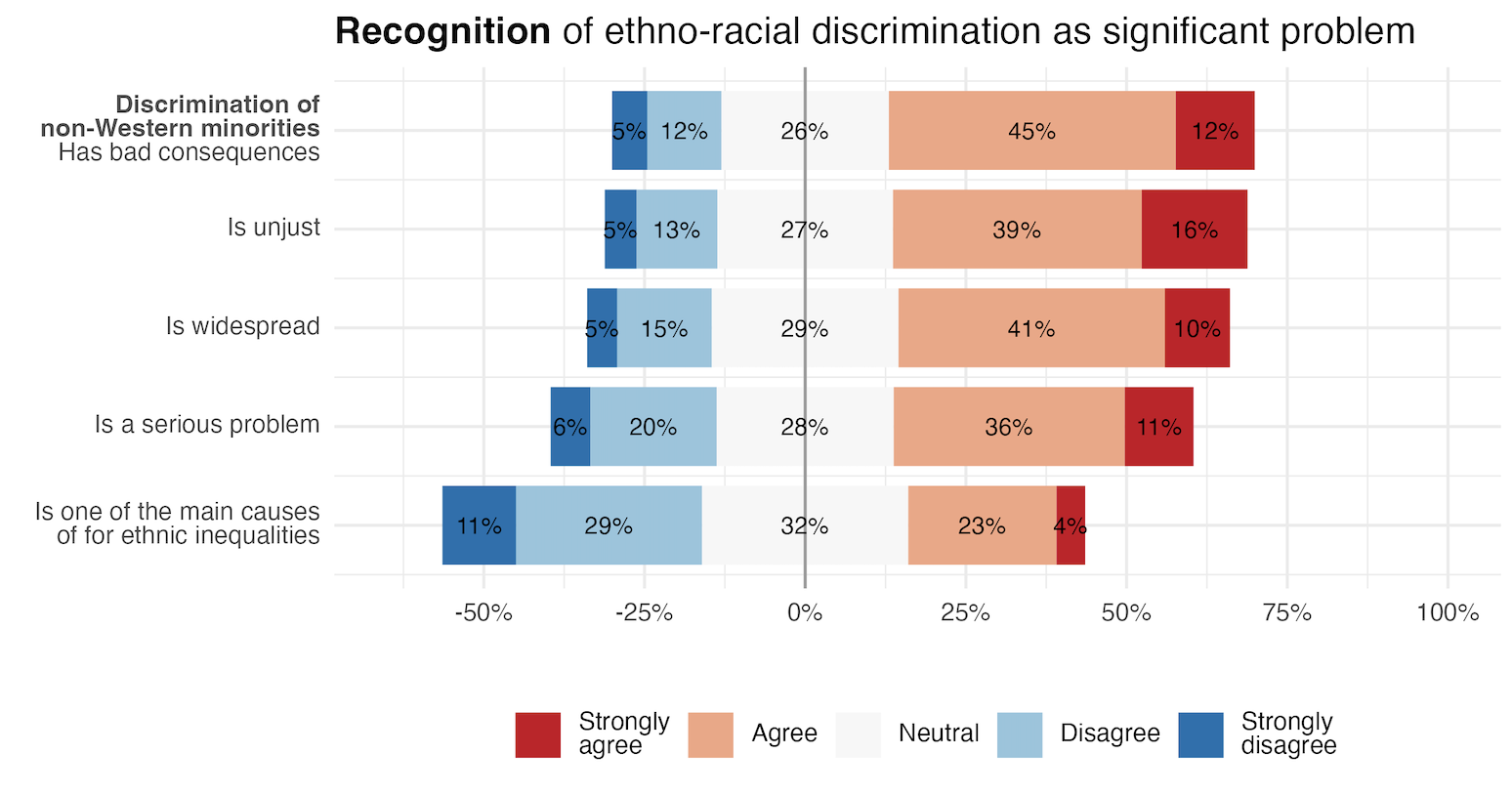
Source: Schaeffer, Krakowski, and Olsen (2023); Post-stratification weighted results. n = 769.

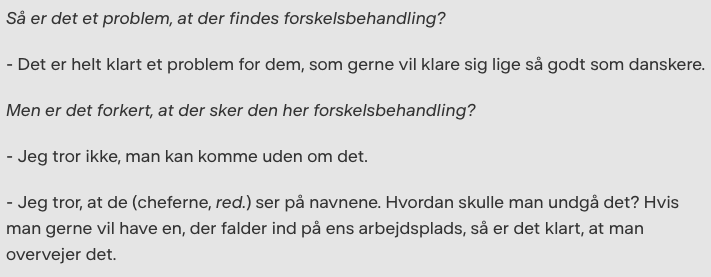 Source: Østergaard (2020)
Source: Østergaard (2020)
- But maybe the causality runs the other way around:
- Because its not seen as unjust, it is prevalent?
Misexpected Personal Discrimination
Claim 3: Typically, people do not expect ethno-racial discrimination,
but when they do, their expectations tend to be wrong.
Claim 4: Perceived and expected discrimination are costly.
- I initially started thinking about this 10 years ago.
- My original question was another one: Are there negative consequences of perceiving too much discrimination?
- Does it make you unhappy beyond actual reason for it?
- Personal discrimination: Do you misperceive the discrimination that you experience?
- Much more difficult: Actual: Repeated experimental observations for real people who can have perceptions!
Central Idea Mutual evaulation in behavioral games
→ Observe actual € sent.
→ Survey expected € received.
True first name & city of residence from registers
Alisina, Ahmad, Anne, Binyamin, Joyce, Somaia, Sarah, Hayriye, Saibe, Björn, Salem, Fabienne, Sadet, Linda, Margarita, Ali, Joseph, Mhd Kheir, Baran, Bahaa, Jebran, Reno, Seiji, Irina, Ajsel, Christine, Rahim, Yaw Abrefa, Mark, Anjali Dev, Elmar, Anke, Laura, Heiko, ...

- Uni of observation is an interaction, not a person!
LLM-based Coding of Names

library(text)# Predict ethnicity of first names.zeroshot_ethnic <- text::textZeroShot( # The list of first names to be predicted. sequences = vornamen, # sequences = vornamen[1:20], # The possible origins for the first names. candidate_labels = c( "deutscher", "muslimischer", "türkischer", "ostasiatischer", "osteuropäischer", "christlicher"), # Indicates whether multiple genders should be predicted for each first name. multi_label = TRUE, # The template for the hypothesis that is generated for each first name. hypothesis_template = "Das ist ein {} Vorname.", # The model that is used to predict the gender. # model = "MoritzLaurer/mDeBERTa-v3-base-mnli-xnli") %>% model = "michaelp11/zeroshot-classification-de") %>% # Renames the column `sequences` to `vorname`. rename(vorname = sequence)LLM-based Coding of Names

library(text)# Predict ethnicity of first names.zeroshot_ethnic <- text::textZeroShot( # The list of first names to be predicted. sequences = vornamen, # sequences = vornamen[1:20], # The possible origins for the first names. candidate_labels = c( "deutscher", "muslimischer", "türkischer", "ostasiatischer", "osteuropäischer", "christlicher"), # Indicates whether multiple genders should be predicted for each first name. multi_label = TRUE, # The template for the hypothesis that is generated for each first name. hypothesis_template = "Das ist ein {} Vorname.", # The model that is used to predict the gender. # model = "MoritzLaurer/mDeBERTa-v3-base-mnli-xnli") %>% model = "michaelp11/zeroshot-classification-de") %>% # Renames the column `sequences` to `vorname`. rename(vorname = sequence)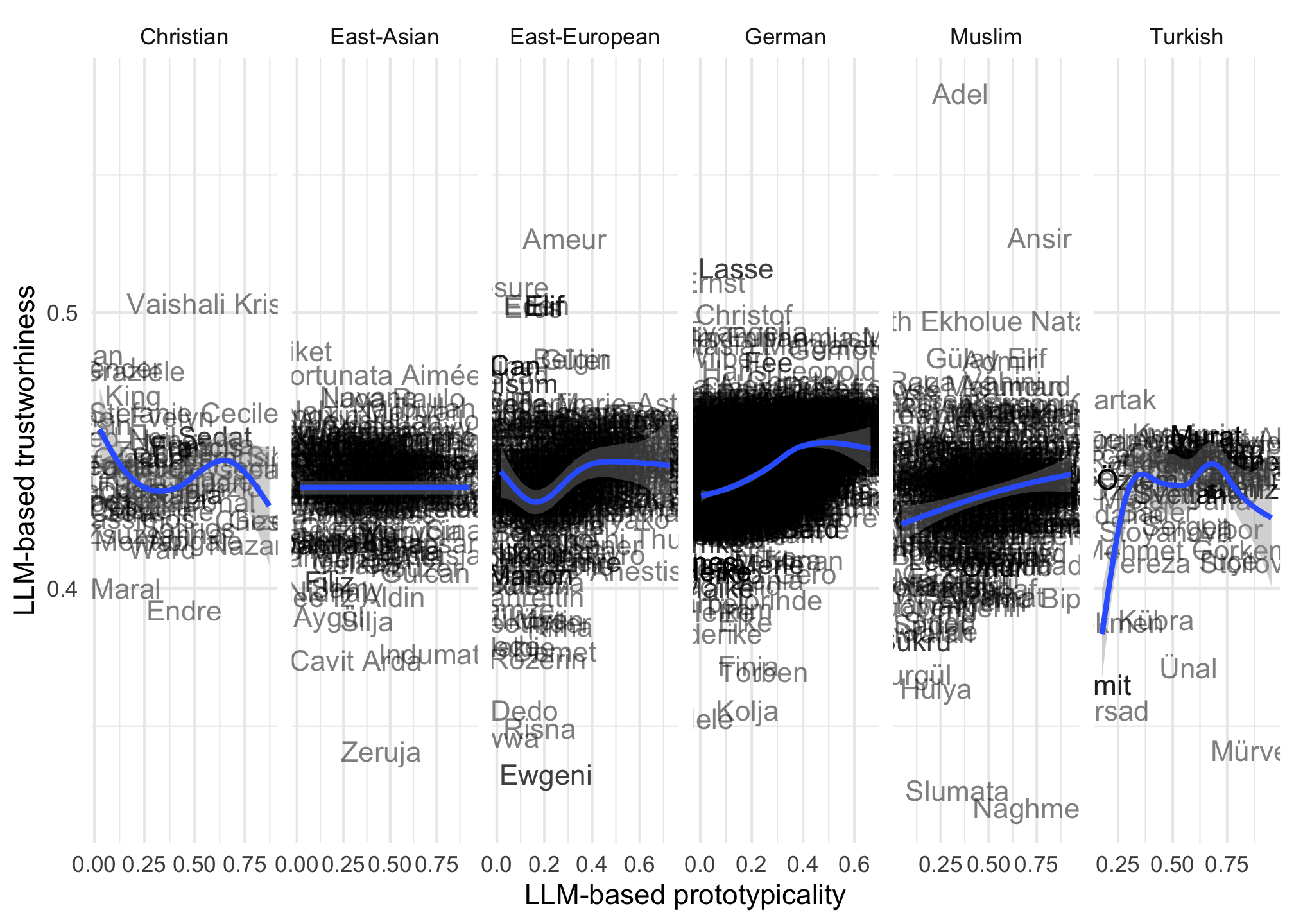
10 Trust Games per Participant
- Majority participants:
- 3 games with mainstream players.
- 7 games with immigrant origin players.
- Immigrant origin participants:
- 7 games with mainstream players.
- 3 games with immigrant origin players.
→ Observe actual € sent to others.
| Name | N | % |
|---|---|---|
| Majority with German name | 10650 | 53.0 |
| Minority with Christian name | 330 | 1.6 |
| Minority with East-Asian name | 1310 | 6.5 |
| Minority with East-European name | 1640 | 8.2 |
| Minority with German name | 3430 | 17.1 |
| Minority with Muslim name | 2110 | 10.5 |
| Minority with Turkish name | 630 | 3.1 |
- Scientist: Repeated observations.
10 Trust Games per Participant
- Majority participants:
- 3 games with mainstream players.
- 7 games with immigrant origin players.
- Immigrant origin participants:
- 7 games with mainstream players.
- 3 games with immigrant origin players.
→ Observe actual € sent to others.
| Name | N | % |
|---|---|---|
| Majority with German name | 10650 | 53.0 |
| Minority with Christian name | 330 | 1.6 |
| Minority with East-Asian name | 1310 | 6.5 |
| Minority with East-European name | 1640 | 8.2 |
| Minority with German name | 3430 | 17.1 |
| Minority with Muslim name | 2110 | 10.5 |
| Minority with Turkish name | 630 | 3.1 |

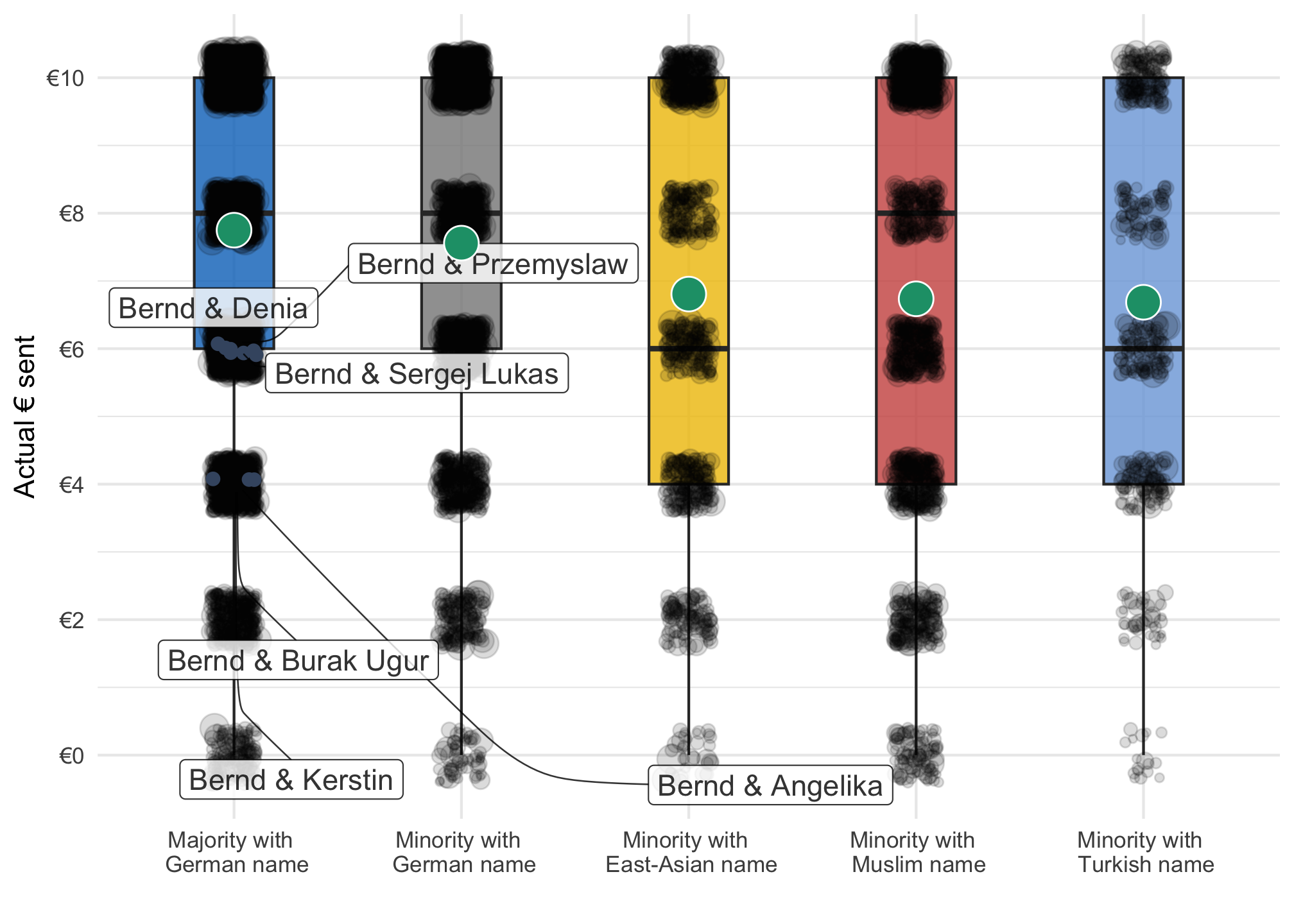
- Scientist: Repeated observations.
- Explain: Dots, groups, boxplots, main message.
- Immigrants entrusted their game partner's a bit less.
- Later: This is partly driven by reports of past discrimination & expected discrimination.
Entrusted € By game partner
- Majority participants:
- 3 games with mainstream players.
- 7 games with immigrant origin players.
- Immigrant origin participants:
- 7 games with mainstream players.
- 3 games with immigrant origin players.
→ Observe actual € sent to others.
| Name | N | % |
|---|---|---|
| Majority with German name | 3137 | 37.3 |
| Minority with East-Asian name | 922 | 11.0 |
| Minority with German name | 2414 | 28.7 |
| Minority with Muslim name | 1484 | 17.7 |
| Minority with Turkish name | 445 | 5.3 |

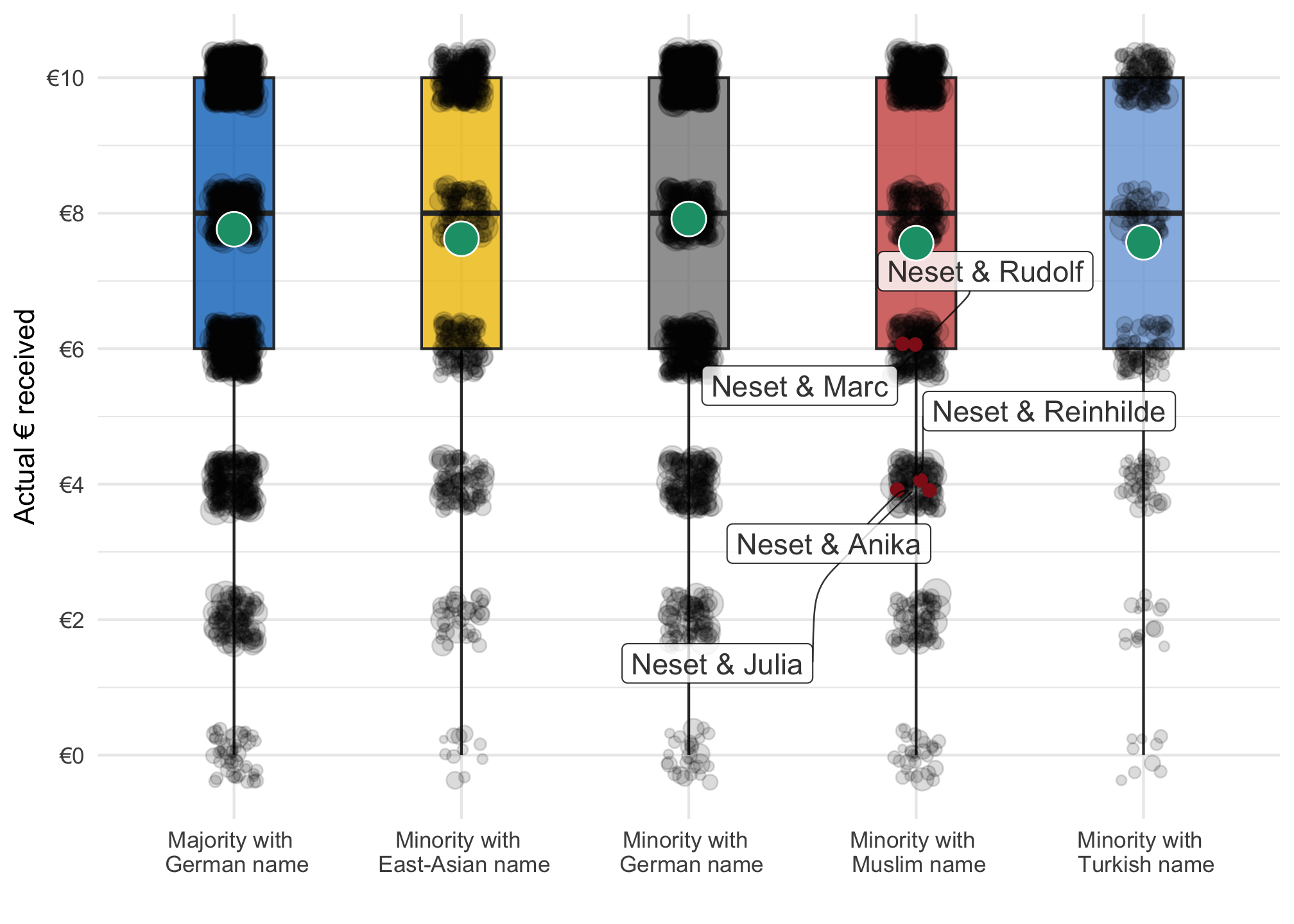
What did their game partner's entrust them?
- Now focus on games with mainstream partners.
LLM-coded connotations & trust
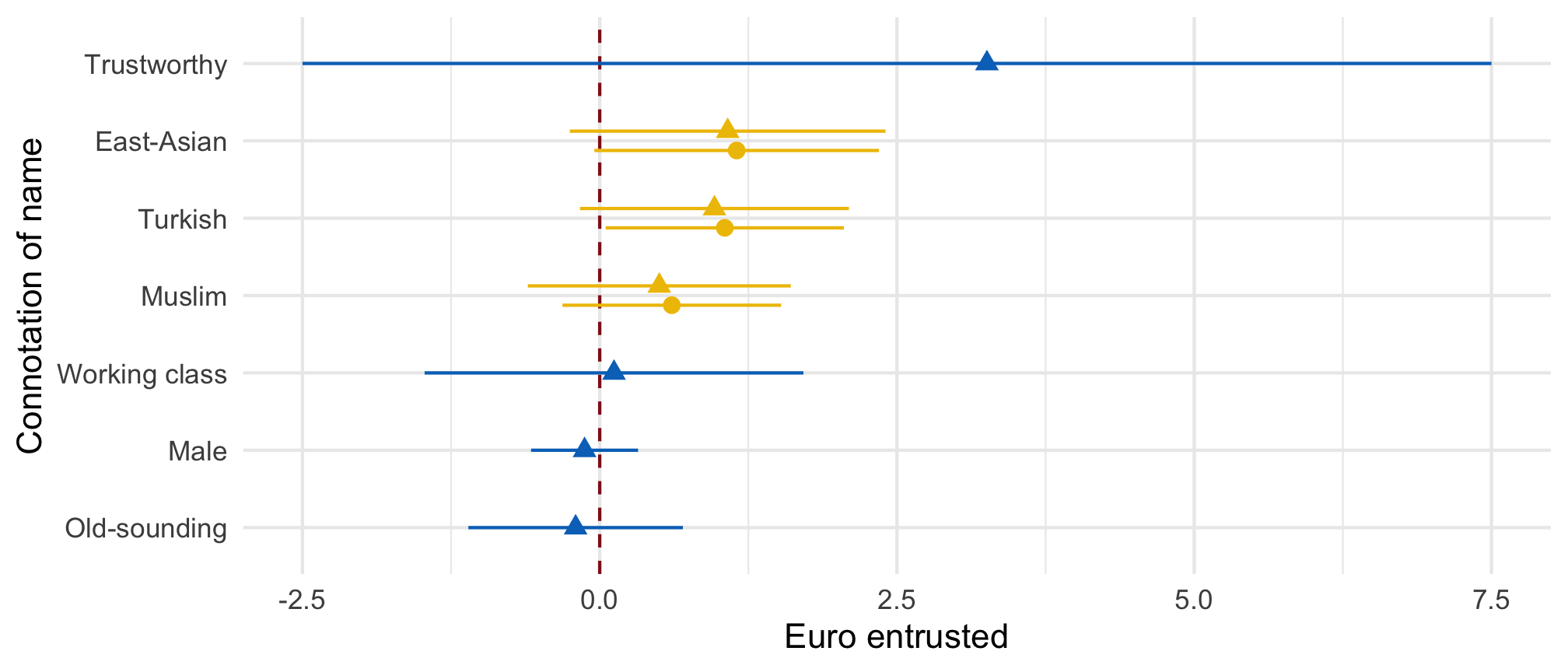
Actual Trust Discrimination By game partner
Act Discrij=€ij−¯€j(Germ. name)
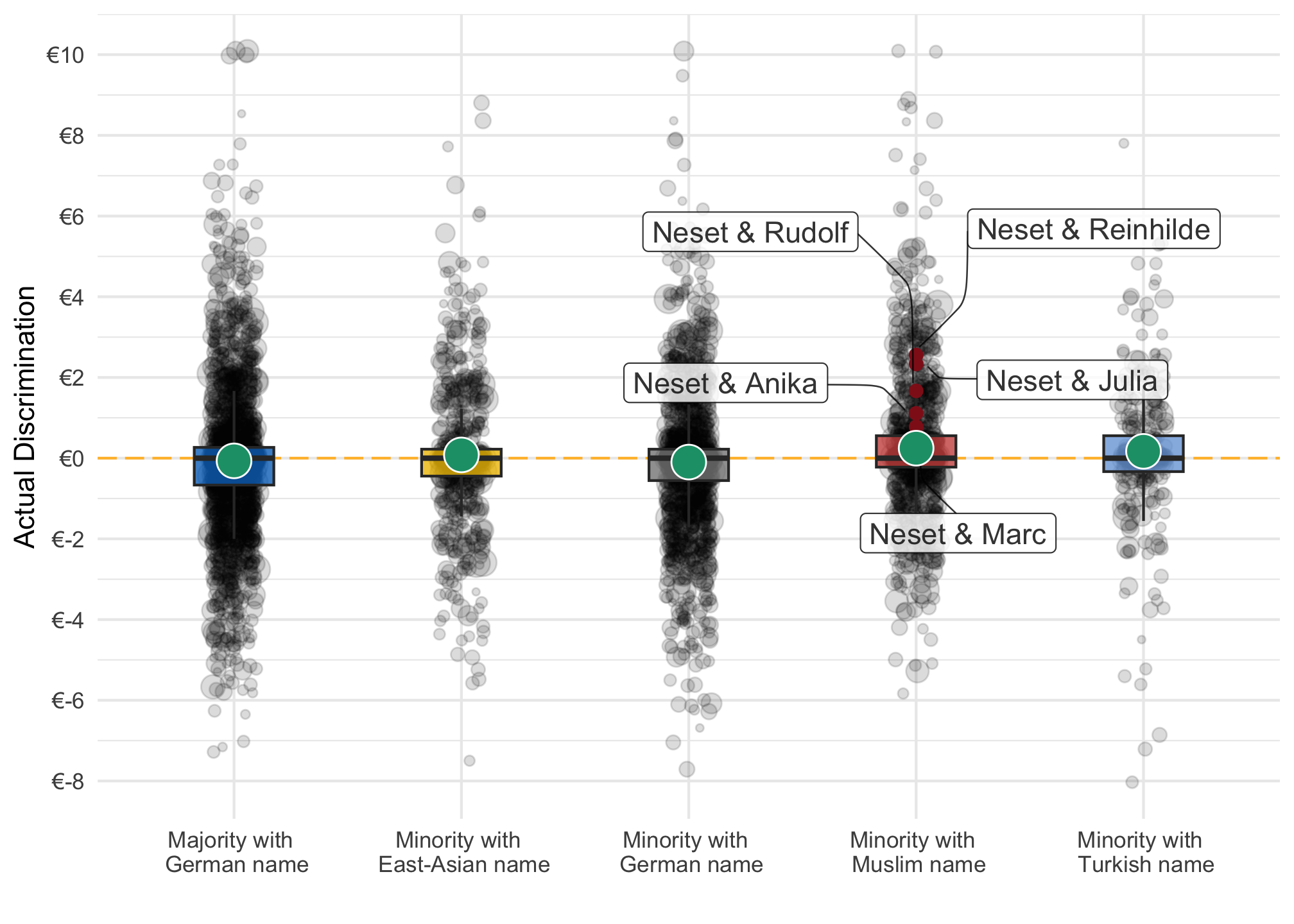
After the 10 Games Expectations to be discriminated
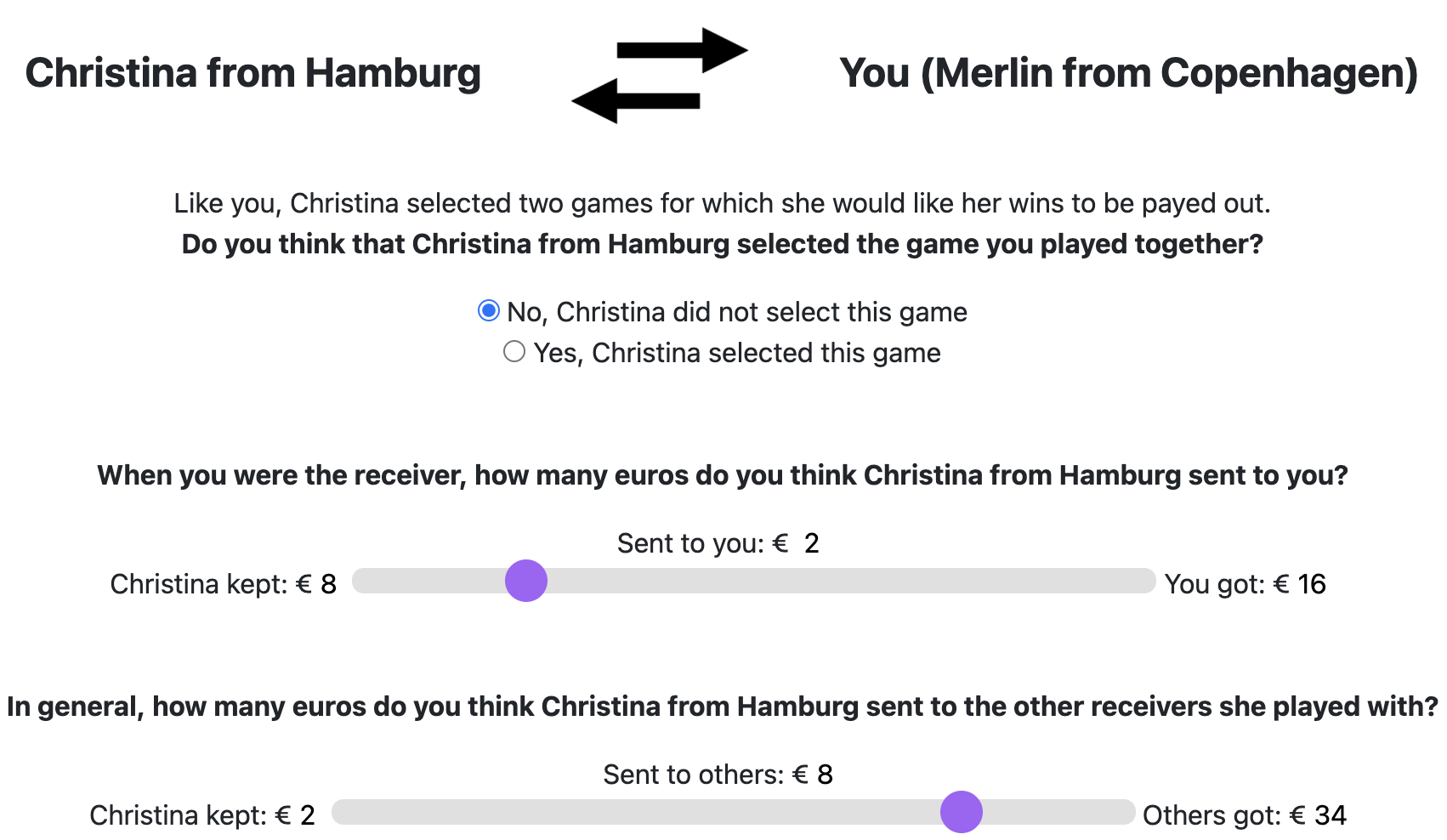
Actual vs. Expected Discrimination
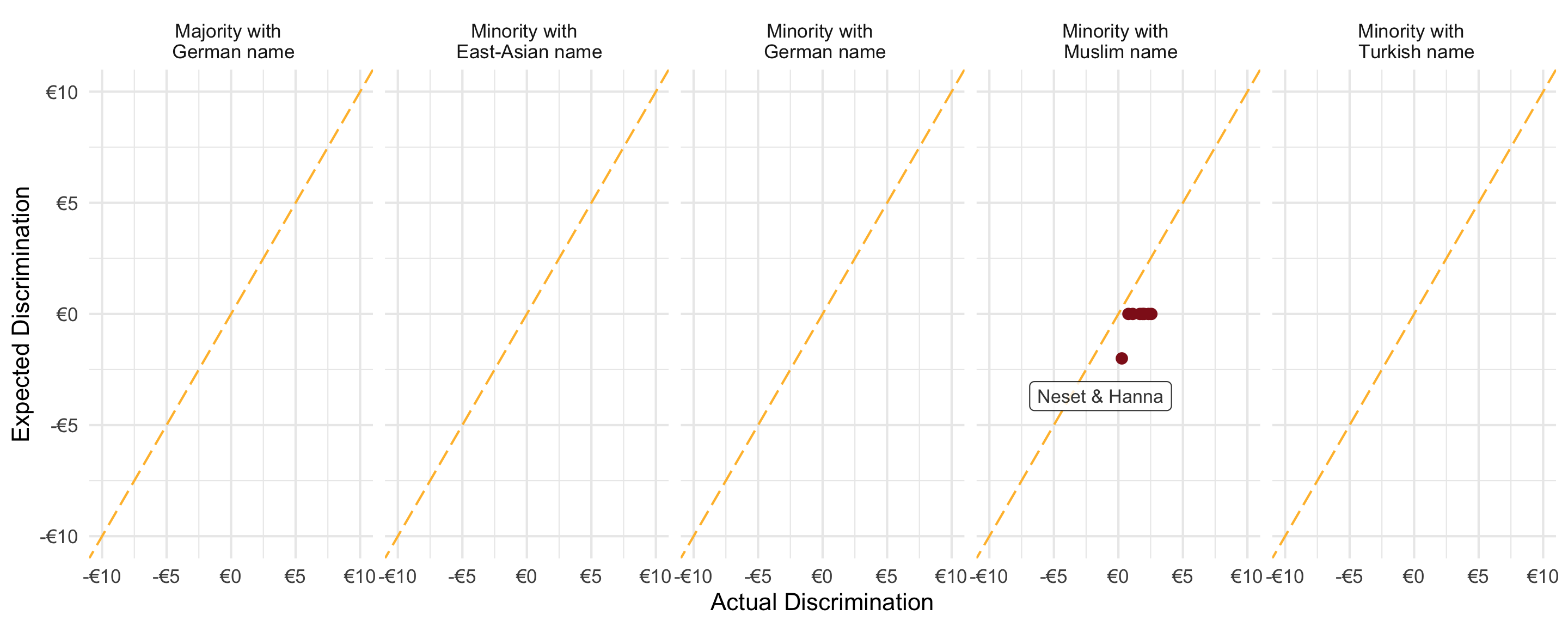
Actual vs. Expected Discrimination
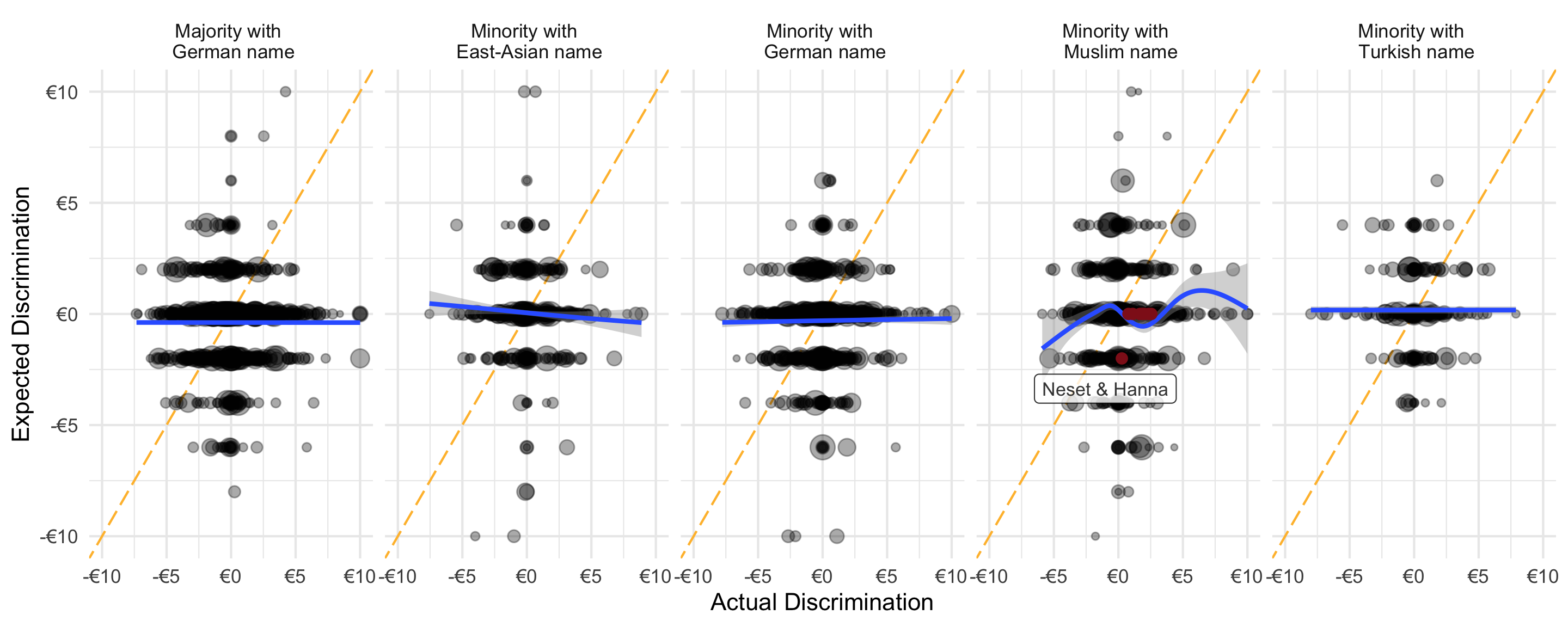
Actual vs. Expected Discrimination
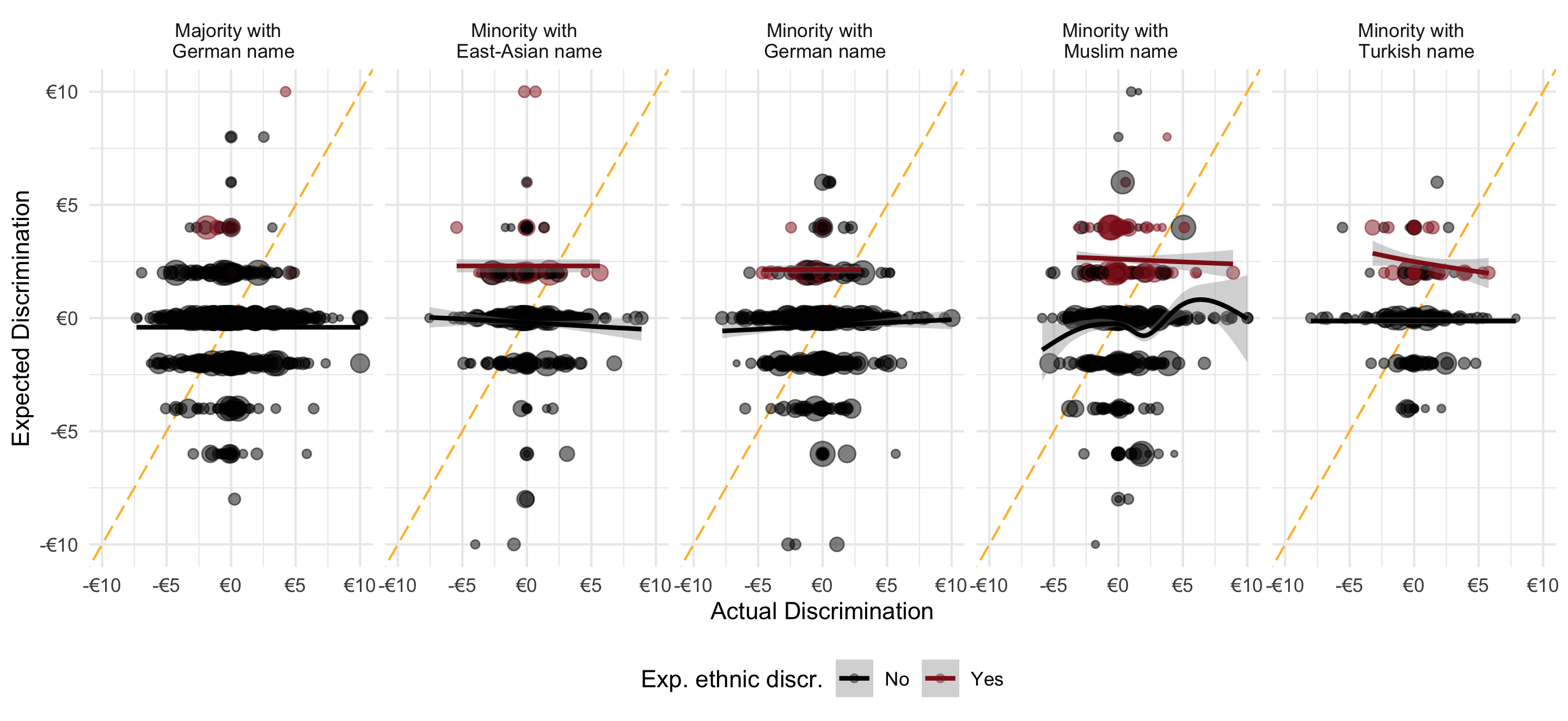
The Cost of Perceived and Expected Discrimination
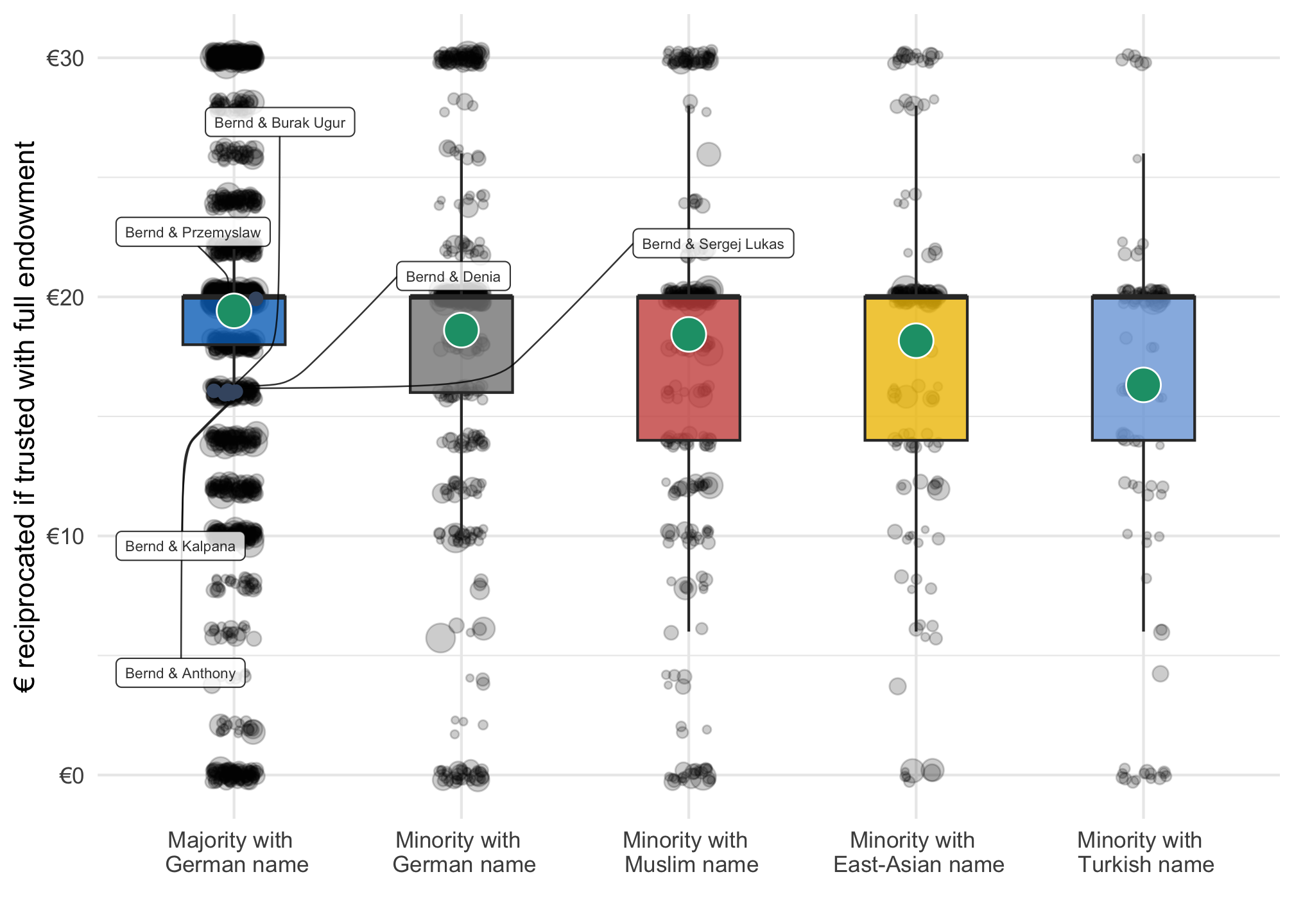
The Cost of Perceived and Expected Discrimination

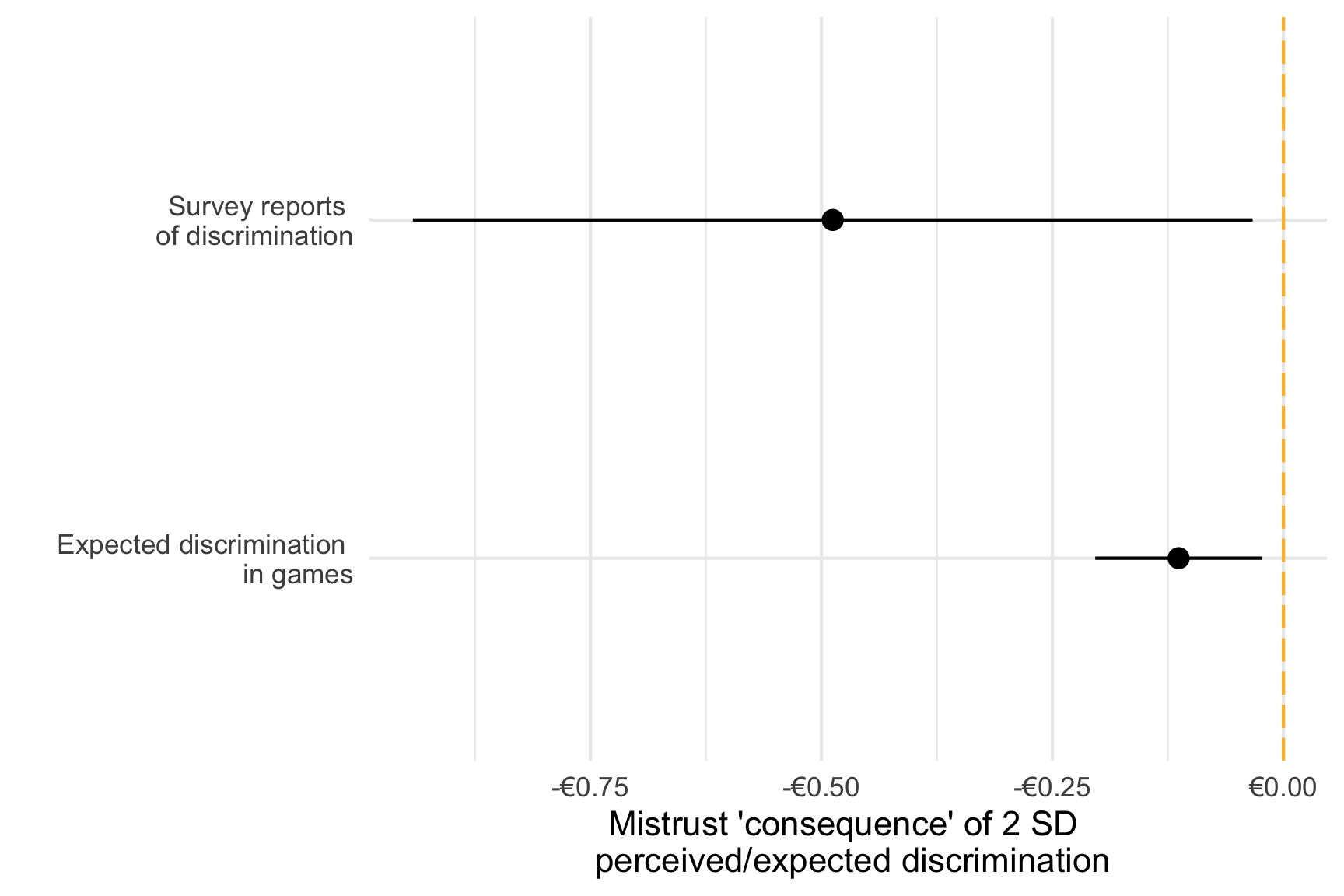
(−0.488€+−0.113€)×3×23×2=−2.4€
−2.4€20€=−12%
Misperceived Personal Discrimination

Claim 6: People tend to overinterpret ambiguous signals as evidence of discrimination.
Claim 7: Majority members overinterpret signals of advantage more than minorities overinterpret signals of disadvantage.
Follow-up Experiment Disadvantage cue
On average, your ten game partners sent and thereby entrusted 6 € to you.
In addition, your ten game partners played trust games with other 68 more participants. 25 of these other participants had names that sound typically German.
Below you see a selection of three of these participants with names that sound typically German.
On average, your game partners sent and thereby entrusted 8 € to these three persons:
Annegret from Hamburg
Klaus from Berlin
Hartmut from München
The three have thus received 2 € more than you. How do you rate this result?
Follow-up Experiment Advantage cue
On average, your ten game partners sent and thereby entrusted 8 € to you.
In addition, your ten game partners played trust games with other 68 more participants. 25 of these other participants had names that sound typically German.
Below you see a selection of three of these participants with names that sound typically German.
On average, your game partners sent and thereby entrusted 6 € to these three persons:
Annegret from Hamburg
Klaus from Berlin
Hartmut from München
The three have thus received 2 € less than you. How do you rate this result?
Follow-up Experiment Equality cue
On average, your ten game partners sent and thereby entrusted 7 € to you.
In addition, your ten game partners played trust games with other 68 more participants. 25 of these other participants had names that sound typically German.
Below you see a selection of three of these participants with names that sound typically German.
On average, your game partners sent and thereby entrusted 7 € to these three persons:
Annegret from Hamburg
Klaus from Berlin
Hartmut from München
The three have thus received the same amount as. How do you rate this result?
My Name Played a Role ...
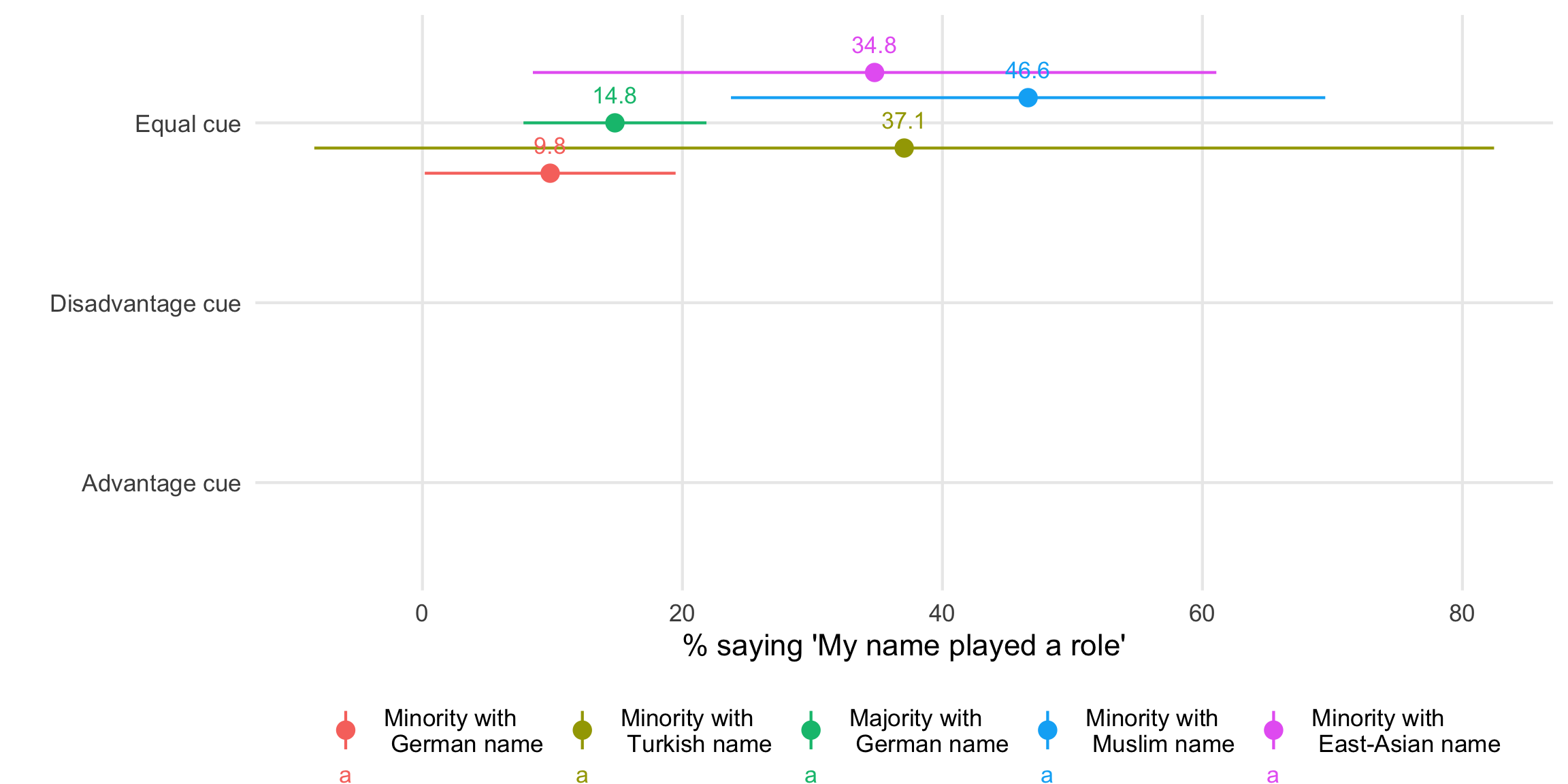
My Name Played a Role ...
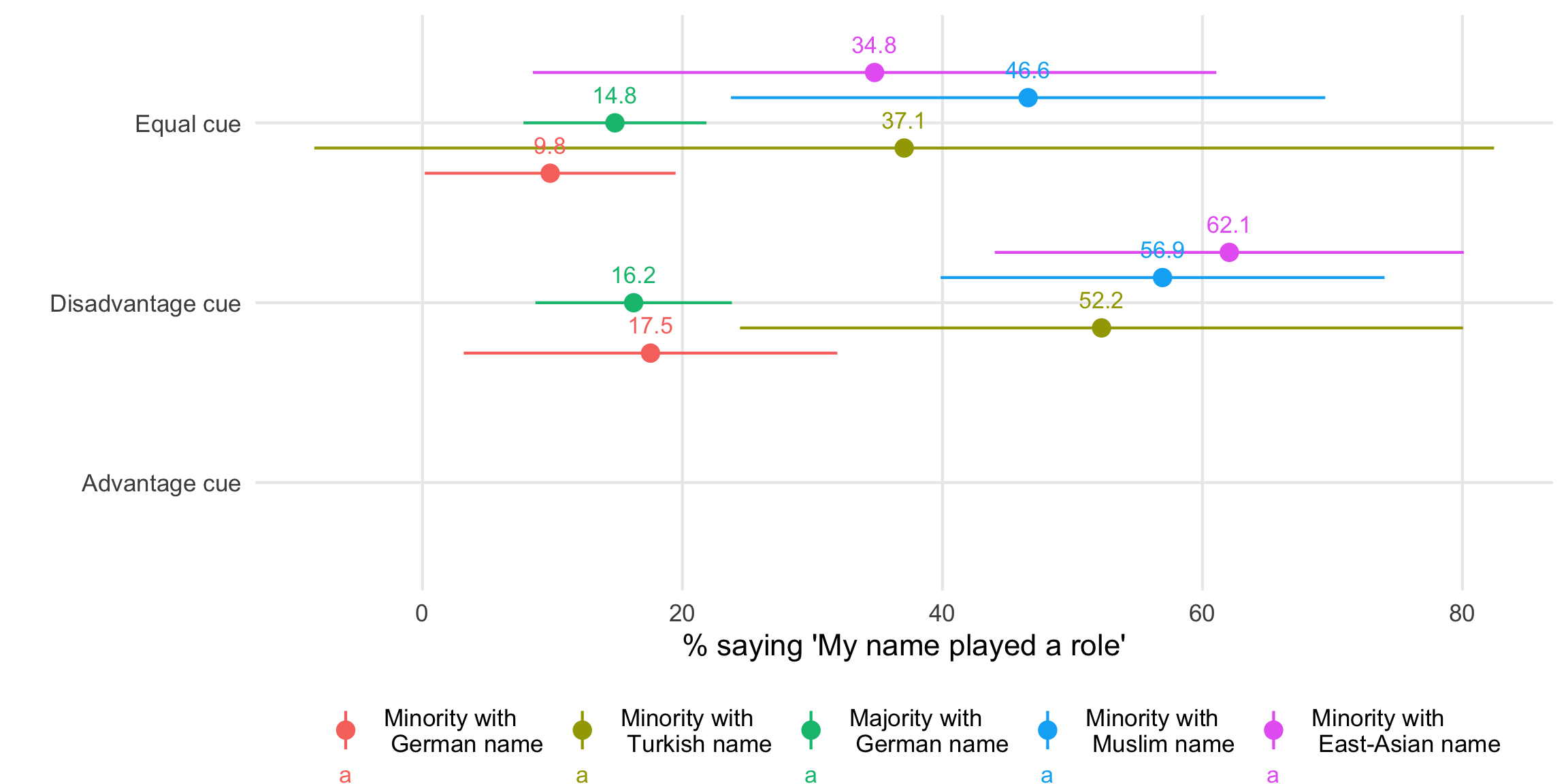
My Name Played a Role ...
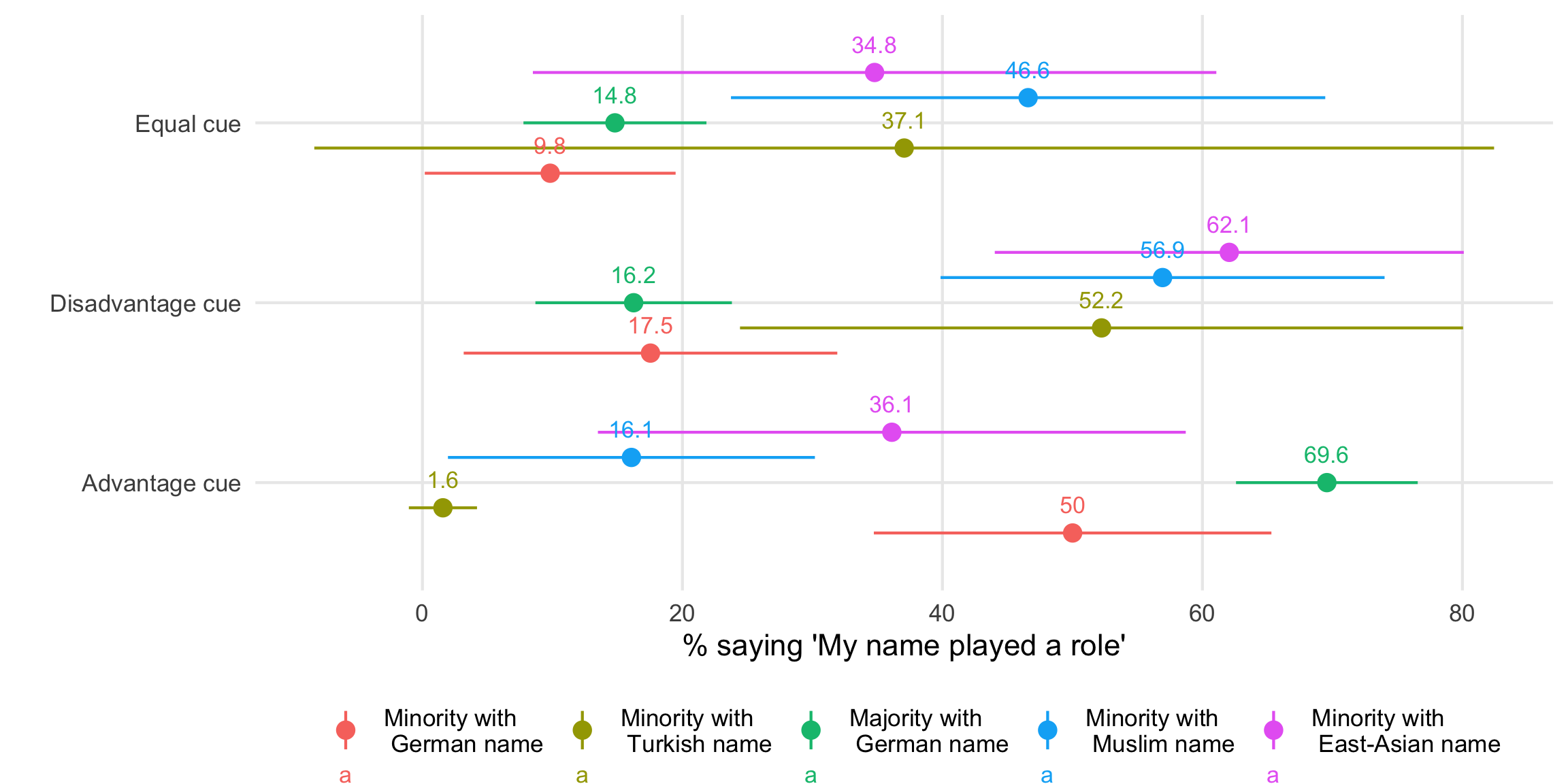
Accurate Perception My name played a role
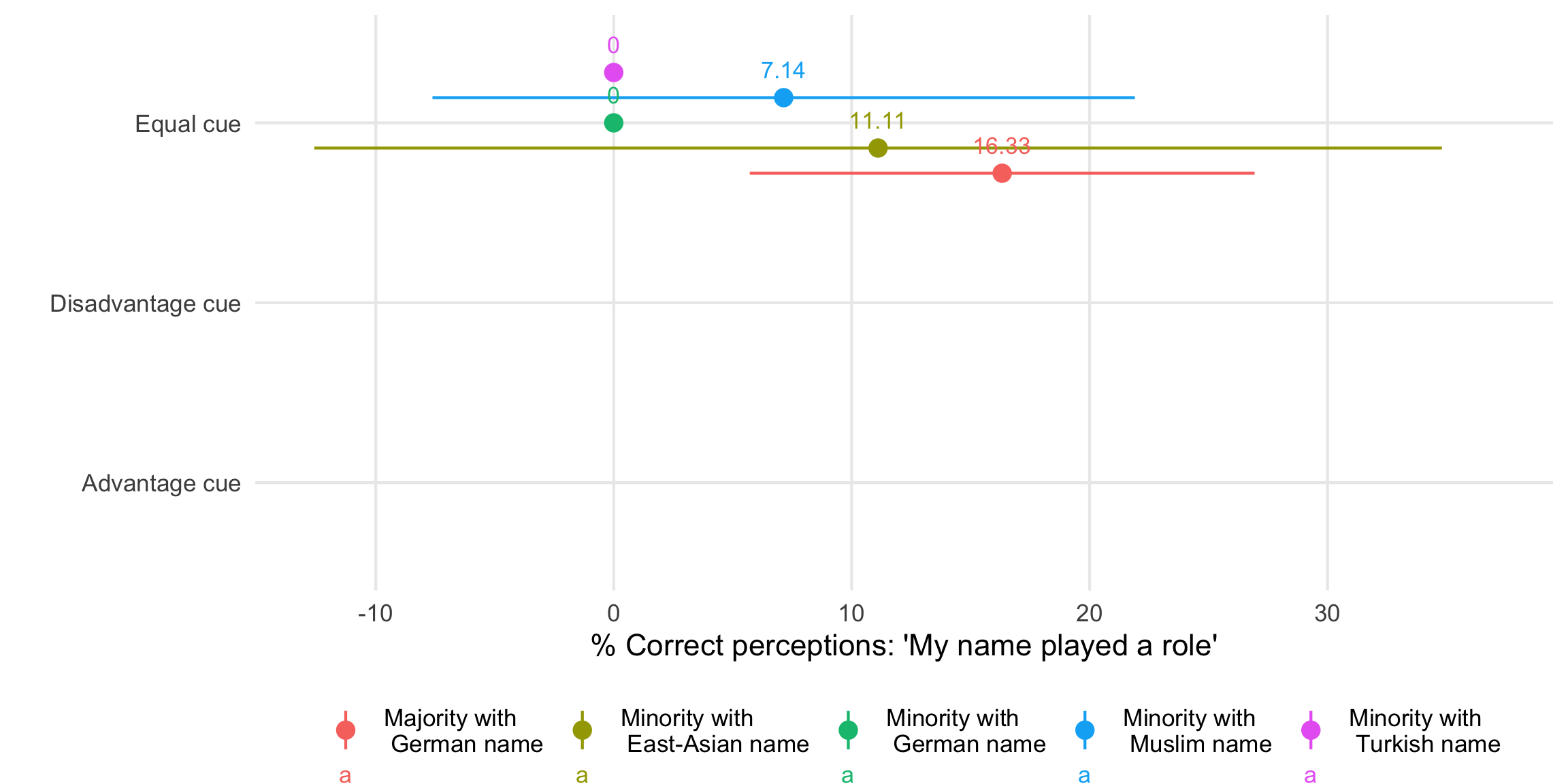
Accurate Perception My name played a role
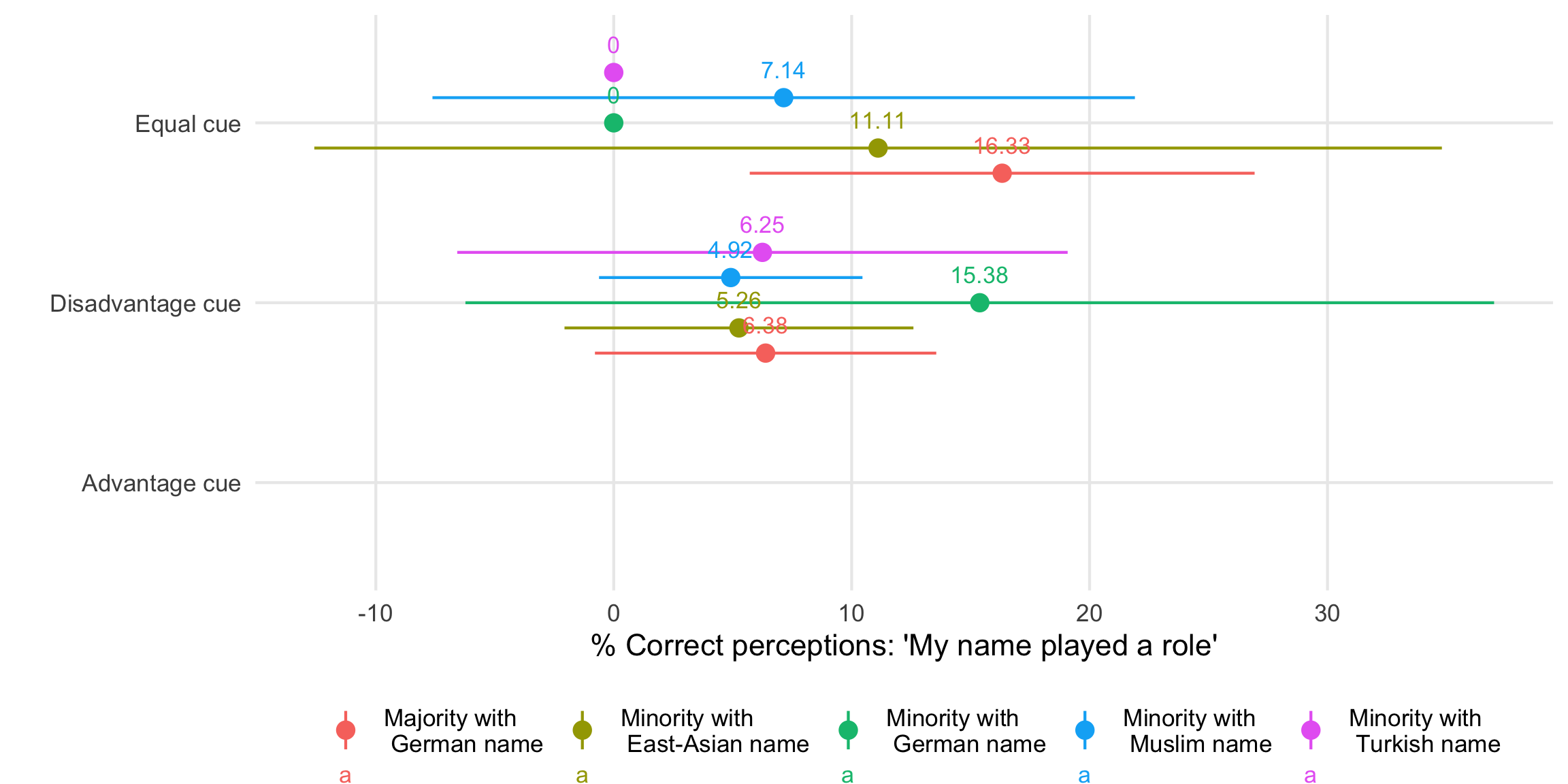
Accurate Perception My name played a role
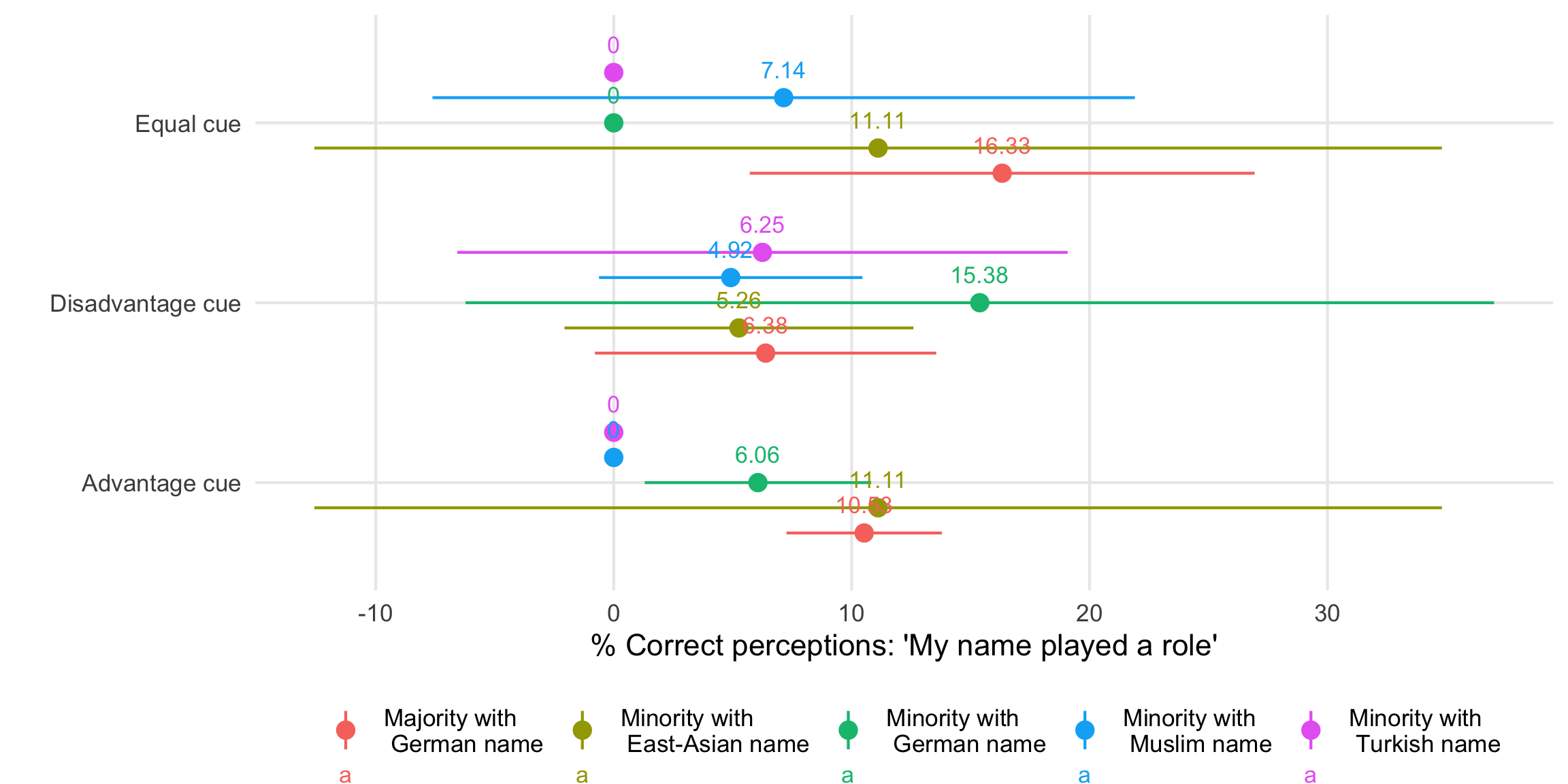
Accurate Perception My name played a role
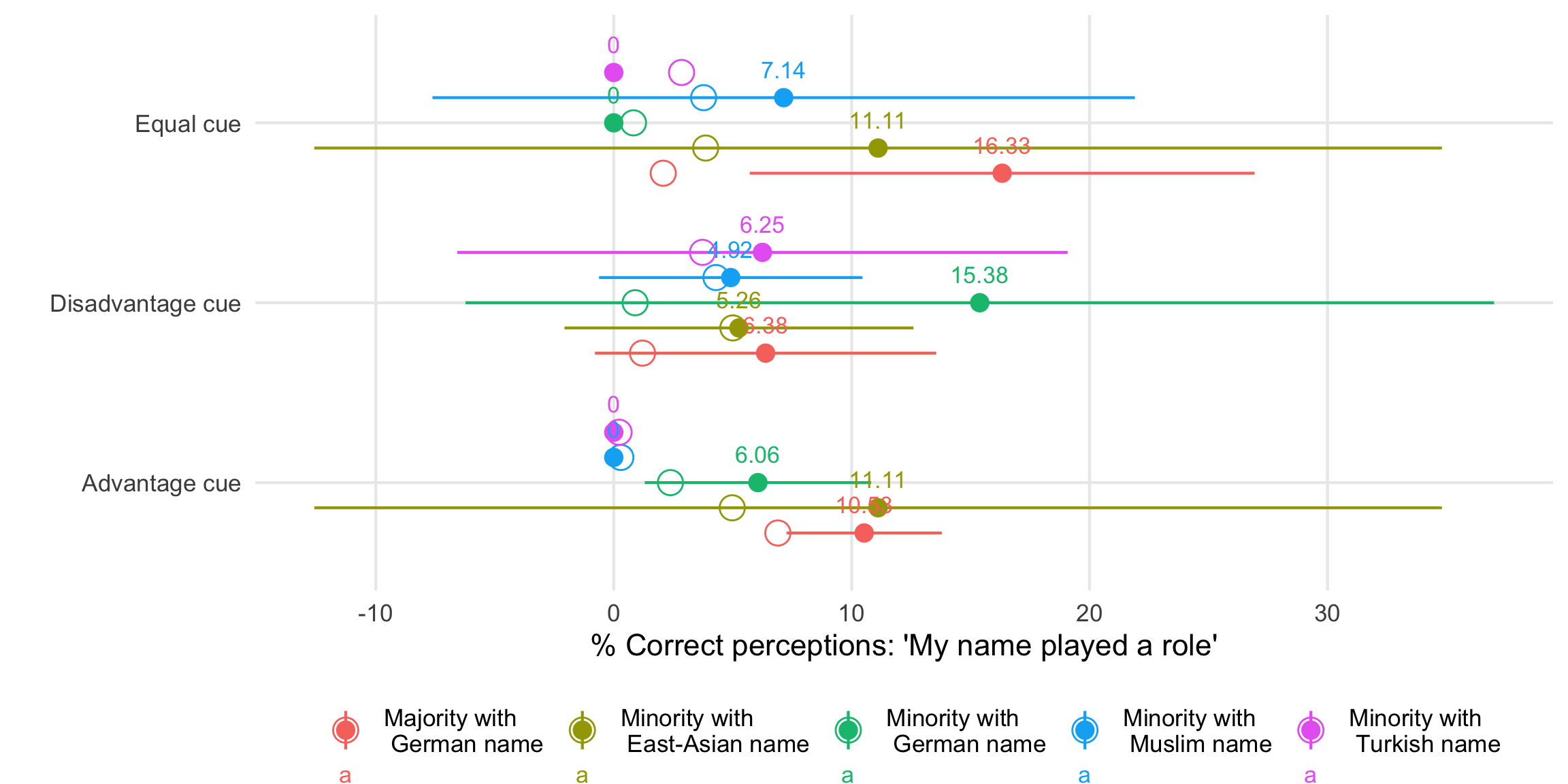
Conclusion for now ...
Thank you for your attention!
Claim 1: Majority citizens tend to overperceive prevalence of minority discrimination.
Claim 2: Lack of awareness does not explain low support for anti-discrimination legislation.
Claim 3: Typically, people do not expect ethno-racial discrimination, but when they do, their expectations tend to be wrong.
Claim 4: Perceived and expected discrimination are costly.
Claim 5: People tend to overinterpret ambiguous signals as evidence of discrimination.
Claim 6: Majority members overinterpret signals of advantage more than minorities overinterpret signals of disadvantage.
References
Haaland, I. and C. Roth (2023). "Beliefs About Racial Discrimination and Support for Pro-Black Policies". In: Review of Economics and Statistics, pp. 40-53.
Østergaard, A. (2020). Detektor: Efter racismedebat – Dansk Folkeparti anerkender forskelsbehandling.
Schaeffer, M., K. Krakowski, and A. L. Olsen (2023). "Correcting Misperceptions about Ethno-Racial Discrimination: The Limits of Evidence-Based Awareness Raising to Promote Support for Equal-Treatment Policies". In: SocArXiv.
Schaeffer, M., K. Krakowski, A. Romarri, et al. (2024). "Far-right Electoral Success Exacerbates Administrative Discrimination Against Minorities: Evidence from a Field Experiment in Italy". In: Unpublished manuscript.
Schaerer, M., C. du Plessis, M. H. B. Nguyen, et al. (2023). "On the trajectory of discrimination: A meta-analysis and forecasting survey capturing 44 years of field experiments on gender and hiring decisions". In: Organizational Behavior and Human Decision Processes, p. 104280.
